
This website is managed by Siam Legal International - a law firm in Thailand


COVID-19 Guide for Travelers to and in Thailand
Required Documents for Travel to Thailand
Please have the following documents ready.
- Visa (if required)
- Buy Thailand Travel Insurance
- Flight Itinerary
- Hotel booking confirmation
- Vaccination record (if vaccinated)
- COVID-19 test result (if unvaccinated)
Incorrect documents will delay the entry screening to Thailand.
Buy Your Insurance Now
Thailand Travel Restrictions 2022
(Updated May 25, 2022)
- Latest updates on Thailand Pass
Top 20 Questions on Thailand Pass
- How to Travel to Thailand in 2022
- Thailand Travel Restrictions
- Join our Facebook Group
- Best COVID Insurance for Thailand
- Test and Go Thailand (March 2022)
- Test and Go Hotels in Bangkok
- Test and Go Hotels in Phuket
- Test and Go Hotels in Pattaya
- Test and Go Hotels in Koh Samui
TODAY’S UPDATE:

- Thailand reopens the country without quarantine to fully vaccinated travelers from any countries and territories under the Test and Go program .
- Fully Vaccinated Thai and foreign travelers from non-listed countries may still enter Thailand without quarantine through the Phuket Sandbox Program , Samui Sandbox , Bangkok, Pattaya , Hua Hin , and Chiang Mai Sandbox starting November 1, 2021.
- The Thai government has restored the mandatory quarantine of 10 days for unvaccinated Thai and foreign travelers.
- Thailand Pass is required for Thai and foreigners to enter Thailand including those nationalities under the Visa Exemption and Visa on Arrival list.
- The Test and Go Hotel , AQ Hotel , SHA+ Hotel reservation, and COVID-19 Insurance with a minimum coverage of $20,000 are still required for foreigners entering Thailand.

- The Thai Embassies and Consulates are now issuing 60-day tourist visa and special tourist visa (STV) and Thailand Pass to enter Thailand .
- Thailand allows semi-commercial flights to travel to Thailand.
- The foreigners to be allowed to enter Thailand will comprise of diplomats and foreign workers including their families, business representatives, and experts invited by the government, permanent residents, foreigners with Thai families, students and their guardians, medical tourists and their attendants, business visa holders, Thai Elite Visa holders, APEC Cardholders, special tourist visa (STV) and tourist visa (TRV) holders, non-immigrant O retirement visa, non-immigrant OA and OX holders and migrant workers with official documents. Foreigners must get in touch with the local Thai Embassy in their current location to apply for a Thailand Pass and for more information.
- From now until September 30, 2022 Thailand will allow long stay foreign tourists under the Special Tourist Visa (STV) Program. This long-stay visa is open to foreign nationals traveling to Thailand with the intention to stay long-term as tourists to boost the tourism industry. Those who are qualified must get in touch with the local Tourism Authority of Thailand Office or Thai Embassy in their current location for more information.
- Frequently Asked Questions below.
I am an expat leaving Thailand for a short time and returning. Do I have to apply for Thailand Pass and Test & Go?
Yes. At this time, all people entering Thailand must apply for a Thailand Pass and follow Test & Go requirements if they are fully vaccinated. This includes having the required entry requirements such as insurance, SHA+ hotel booking, RT-PCR test, and Thailand Pass approval.
I am an expat returning to Thailand. Can I quarantine at home instead of a hotel?
No. No matter what visa you hold in Thailand, you must follow the Test & Go entry requirements. You must spend 1 night in a SHA+ quarantine hotel while waiting for your RT-PCR test result.
Have the April 1 changes to pre-departure RT-PCR testing come into effect?
Yes. Pre-departure RT-PCR tests are no longer required when entering Thailand.
Has the April 1 change come into effect for the Sandbox scheme?
Yes. The Sandbox scheme now requires only 5 nights of quarantine in the Sandbox designated area. Visitors must now do 1 x RT-PCR test and 1 x ATK test on day 5 instead of 2 x RT-PCR tests. The Test & Go program is a better option for those who are fully vaccinated.
Have the April 1 changes come into effect for the un-vaccinated Alternate Quarantine scheme?
Yes. The Alternate Quarantine timeframe has been reduced from 10 nights to 5 nights. You still need to have 2 x RT-PCR tests during this time. The tests will be taken on Day 1 and on Day 4 or 5.
I booked a 10-day Alternate Quarantine package but I am arriving after April 1. What should I do with the new changes?
You may contact your hotel. If you have not arrived in Thailand before April 1, you are eligible for the updated 5-day Alternate Quarantine scheme. Your hotel will advise what options are available to you.
Do I need to print my Thailand Pass documents for when I arrive at Passport Control in Thailand?
Yes. It is the best practice as you will present these documents to Immigration and Health Officers at the airport Passport and Health Control.
If you only have digital copies and something happens to your electronic device, you will not be allowed to enter the country.
How do I present my Thailand Pass QR code if my mobile phone is not working?
You should print a hard copy of your Thailand Pass QR code. If your mobile device does not work in Thailand, you can still present the QR code to Immigration and Health Officers at the airport Passport and Health Control.
Can I upload my Thailand Pass QR code to the MorChana App before I arrive in Thailand?
No. You can download the MorChana App before arriving in Thailand, but it will not allow uploads until you arrive in the country. You may ask your SHA+ hotel staff to assist you on how to navigate the app.
If I land in Phuket with the correct insurance, my SHA+ hotel, airport transfer, and separate RT-PCR tests booked, can I apply for Test & Go?
Yes. The above requirements are required to apply for Test & Go and Thailand Pass. You will also need to be vaccinated to apply for Test & Go.
Have the April 1 changes affected domestic flights in Thailand?
No. When landing in Thailand, domestic flights on arrival must still be approved “sealed” flights. Please check with Thai Airways and Bangkok Airways for the new list of sealed flights to Phuket and Samui.
Can I do my Test & Go quarantine in Pattaya?
Yes. If you land in Bangkok you can organize Test & Go quarantine in Pattaya. Your SHA+ hotel must provide transport from Bangkok airport to the hotel.
If your flight lands directly at Pattaya airport you will do your RT-PCR test at the airport and then be transported to your hotel.
Are international flights landing in Pattaya?
There are flights now landing directly at Pattaya U-tapao International Airport. Check with your airline provider for available direct flights.
Can I take a domestic flight from Bangkok to Pattaya for Test & Go quarantine?
Only if the flight is an approved “sealed” flight. This should be booked as part of your international flight itinerary.
If you book separate domestic flights, you are required to quarantine for 1 night in Bangkok before traveling to Pattaya.
What SHA+/AQ hotels are available in Pattaya?
You can find the latest information for SHA+/AQ hotels in Pattaya at Agoda .
Why is my US credit card being rejected when trying to book my RT-PCR test?
There is an issue with www.thailandpsas.com approving transactions with American credit cards. You can contact your hotel and they will organize the RT-PCR test booking for you.
I am trying to book hotel transport in Phuket with an American credit card and it is rejected. What can I do?
Transport from the airport to your hotel should be included in your SHA+ quarantine package. If there is an issue booking your hotel with an American credit card, try a different card or purchase through PayPal.
My hotel in Phuket does not offer transport from the hotel. What should I do?
Any SHA+/AQ hotel should include transport from the airport to their hotel. If they do not offer this service, it is best to look at different hotels because you cannot organize private transport.
Where can I see if hotel transfer is included in Phuket when looking at Agoda?
Many Phuket hotels do not list Airport Transfer on their front page. Click into the hotel and look at the bottom left corner of the details page. Airport transfer will be listed here under services offered.
How do I book a private transfer from the airport to a hotel in Phuket?
You cannot. Transfer from Phuket airport to your hotel must be provided by the hotel so it meets all Covid safety measures.
Siam Legal Visa and Thailand Pass Application Assistance
Package 1: 395 usd (for canada, uk and us only) 3-4 weeks.
- Thai Visa Consultation with our Visa Specialist
- Assistance in Thai visa application (non-immigrant O visa and tourist visa)
- Assistance in Thailand Pass application
- Assistance in booking an AQ or SHA+ or Test & Go Hotel
- Assistance in getting the best COVID insurance in Thailand
- Assistance in booking the flight to Thailand
Package 2: 200 USD (for Canada, UK and US only) 3-4 weeks
- Thai Visa Consultation with our Thai Visa consultant
- Extensive checklist of required documents
- Assistance in Thai visa application (non-immigrant O marriage visa and tourist visa)
Package 3: 100 USD (all eligible countries) 5-7 days
- Visa Consultation with our Thai Visa consultant
- Assistance in Thailand Pass application (including visa exemption)
COVID-19 Thailand Visa Amnesty/Extension
What is a visa amnesty or covid extension.
It is the visa relief or 60-day visa extension for all foreign nationals staying in Thailand affected by the COVID-19 crisis. Foreigners can apply for a COVID extension at any immigration office until March 25, 2022.
Who are covered by the visa amnesty or COVID extension?
All foreign nationals who are legally staying in Thailand whether you are here on visa exemption entry stamps and tourist visas. The holders of non-immigrant visas, or yearly extension of stays are not eligible for the COVID extension.
What are the current implementing rules regarding the visa amnesty or COVID extension?
- Visas or permits to stay that are still valid and updated by the local Thai immigration office.
- Foreigners holding a long-term visa such as a working visa, marriage visa, or retirement are required to apply for their yearly extension at the Thai immigration office as usual.
- Foreigners do not need any embassy letter to be granted the automatic visa extension due to COVID-19.
Is the COVID-19 visa extension free of charge?
The COVID-19 extension of the visa costs 1,900 Thai baht.
Will the visa amnesty be extended?
The validity of the visa amnesty is until March 25, 2022 only. There is no indication that this visa amnesty or grace period will be extended.
What will happen when the visa amnesty is lifted or not extended anymore?
When the situation is resolved and returns to normal, foreigners must leave Thailand on or before the permit to stay date in their passports or they must apply for the proper another type of visa at the immigration office.
Want to stay in Thailand for up to 20 years? Consider the Thailand Elite Visa program.
90-Day Reporting
If you are a foreigner staying in Thailand for a period longer than 90 consecutive days holding a Non-Immigrant Visa or Extension of Stay, you are required by Thai Immigration to report your current address every 90 days. You may file for the TM47 notification in person, by mail, online, or by an agent. Please check this page: https://www.thaiembassy.com/thailand/90-day-reporting-immigration.php
Consequences of Visa Overstay
During this COVID-19 crisis in Thailand, some foreign nationals may find themselves overstaying in Thailand, do so by mistake, by miscalculating the length of their stay, forgetting their visa expiration date, or by unforeseen cancellation of their flights due to travel restrictions. As a traveler, you should strongly avoid overstaying in Thailand, but if you do find yourself in Thailand on an expired visa it is very important that you act fast and in the right way. Please check this page to learn more of the consequences of overstaying in Thailand: https://www.thaiembassy.com/thailand/overstay-visa-thailand.php
Top Services provided by Siam Legal International, Thailand’s largest legal service network.
- Thai Retirement Visa
- Thai Notary Service
- Property Lawyer
- Divorce Lawyer Thailand
- US Visa from Thailand
- UK Visa from Thailand
- Litigation Lawyer
- Opening a Thai Bank Account
- Drafting of Thai Will
- Company Registration Thailand
- Thai Elite Visa
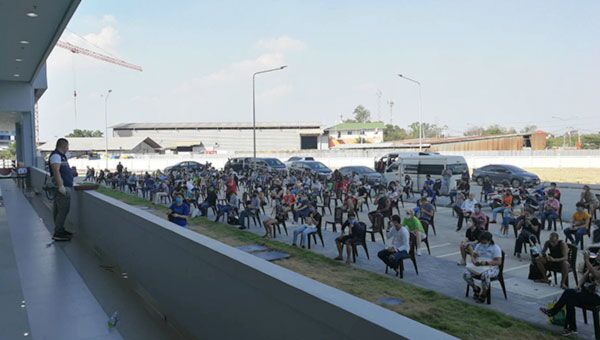
Visa Exemption and Visa on Arrival
Foreigners under the Visa Exemption program and the Visa on Arrival programs may now travel to Thailand. Foreigners under the Visa Exemption may enter Thailand without a visa for up to 30 days and travelers under the Visa on Arrival program may stay in Thailand for up to 15 days. Travelers under the Visa Exemption and the Visa on Arrival must apply for Thailand Pass before traveling to Thailand.
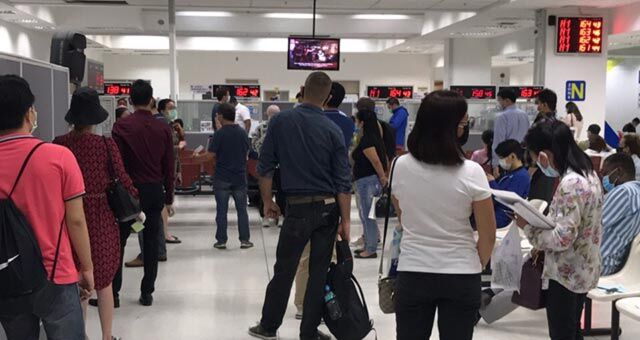
Frequently Asked Questions
To extend a tourist visa, do i need to visit the thai immigration office in person i do not want to go to crowded areas at risk of covid-19 infection..
Yes, there have been no changes regarding the visa extension application whether it is your first time to extend or the second time to extend. The application is still done in person. Thai immigration offices are practicing different measures such as social distancing and disinfecting the area to make sure that the applicants are not at risk of contracting the COVID-19. You might want to see if your local Thai immigration is open on Saturdays. That is a less crowded day of the week to visit the immigration office.
I have tried online reporting and reporting through a mobile app, both attempts failed. What are my other options?
If the online and mobile app reporting does not work, you need to do the reporting by yourself or you can ask a visa agent or third party to do the 90-day address reporting. You need to provide a power of attorney and the 90-day reporting documents such as the original and copy of the passport. There is no immigration fee for address reporting.
Is it required by law to wear a face mask?
The emergency decree issued by the Thai Government that came into effect recommends everyone wear a face mask when they are outside of their residence. However, some provinces such as Phuket have their own rule and you will be subject to a penalty. In Bangkok, commuters are required to wear a face mask when using public transportation and while in public places.
Should I carry my passport at all times?
Yes. If you are a foreigner and you will be out of your residence or hotel, you need to carry your passport especially right now that there are random checks to check the visa validity. It is also good to know that there are banks that would not allow you to enter the premises if you have traveled recently abroad, so it is best to have your passport with you at all times.
I am aware of the entry requirements for foreigners entering Thailand, is there special consideration for those traveling with my Thai family or visiting my Thai family?
At the moment, you can enter Thailand. You just have to make sure that you have obtained a Thailand Pass , purchased COVID-19 Insurance , had a COVID-19 test and you will undergo a mandatory Test and Go or ASQ quarantine.
I have a Non-Immigrant B visa and work permit expiring on April 24, due to my country’s travel restriction I cannot return to Thailand to renew it. What are my options?
If your country does not allow you to travel to Thailand or if your country of departure is under the travel ban, I regret to inform you that there is nothing you are able to do. It is not possible to renew it while you are outside Thailand and it is also not possible to renew it at the Thai embassy in your country. Should your visa and work permit expire while you are outside Thailand, you need to apply for a new non-immigrant B visa for you to enter Thailand and after you have entered Thailand, you can apply for a new work permit.
When do I need the embassy letter for the COVID-19 visa extension?
As of writing, the embassy letter is no longer required by the immigration office to receive the 60-day COVID-19 extensions.
I am looking for flights from Laos to Europe and this requires me to transit in Thailand. Do I need a Health Certificate when transiting? There are multiple different articles including the one on Thai Airways stating that a Health Certificate is required for transiting passengers.
As of writing, international passengers including transiting passengers are required to present a COVID-19 health certificate and negative COVID test result. If you are affected by this travel requirement, you may opt to postpone your travel or you may opt to book a flight that will not transit through Thailand. For the latest update, it is best to contact your airline.
I am a US citizen traveling from the US to Thailand via Hong Kong, am I subject to mandatory quarantine?
No, the mandatory quarantine is not required for any foreigner and Thai travelers entering Thailand via Hong Kong if you are fully vaccinated. You may apply for Thailand Pass under the Test and Go program. The mandatory 10-day quarantine is only required for unvaccinated travelers from any country.
I’m a French national. I have 60 days tourist visa, which is ending soon, but due to COVID-19, I am kind of reluctant to travel back to France. Is there any way that I can extend my visa for another 30 days?
Yes, any nationality holding a 60-day tourist visa entry stamp can extend for 30 days at the local immigration office. For the extension, you just have to submit one passport-size photo (4cm x 6cm) with white background, TM6 card, TM30 receipt from your hotel, and pay the fee of 1,900 Thai baht.
I am British and I entered Thailand on holiday on March 3 and am scheduled to leave on April 1. If my flight is canceled due to COVID-19, I may be forced to overstay my 30 days permit to stay until I have a rescheduled flight. Is this ok? If not, what should I do?
You are able to extend this 30-day visa exemption stamp for another 30 days at the local Thai immigration office. For the extension, you just have to submit one passport-size photo (4cm x 6cm) with white background, TM6 card, TM30 receipt from your hotel, and pay the fee of 1,900 Thai baht.
I am an American and I have a 30-day visa exemption that I extended for an extra 30 days. My current extension will expire on April 1, 2021. What are my options to stay in Thailand due to the travel restriction in other countries?
You have two options: 1.) You can extend your current extension for 30 days at your local immigration office. 2.) You can request a COVID-19 extension and you will be given a 60 days extension at your local Thai immigration office.
I have a non-immigrant O visa for having a Thai wife. It is a single entry visa. My 90-day entry stamp will expire in April and the money in my account has not seasoned yet for 2 months. What can I do?
Since you are legally married to a Thai national, you can apply for a 60-day extension for having a Thai wife. This extension will give you enough time for your funds to season for 2 months. After your funds have seasoned for 2 months, you may apply for a 1-year extension or marriage visa.
My work permit and my visa will expire by the end of the month. Due to the current COVID-19 situation, I am not able to return to my country. What are my options?
Since your visa and your work permit will expire, your only option for an extension of your stay in Thailand is to file for the 60-day COVID extension. You may apply for this extension on the last day of your permit to stay.
I am flying from the USA to Thailand via Hong Kong. Do I still need to present a health certificate and travel insurance?
At the moment, passengers entering Thailand need to obtain the Thailand Pass , purchase a COVID-19 insurance , book Test and Go Hotel for 1 night, or an ASQ Hotel for the 10-day quarantine (if not vaccinated), and obtain a COVID-19 medical certificate.
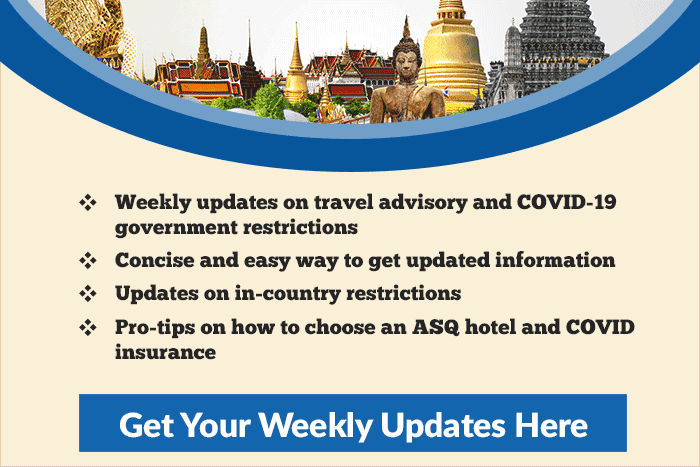
Can anyone advise what to do regarding my Non-B visa? My Non-B expired on 4th March. I have to pay a fine of 500 baht per day for overstay. The borders around Thailand are closed for me to renew it. I have requested a 30-day extension but was refused. They need my new contract for the new year. This is costing me an arm and a leg. What are my solutions?
The best solution for this is to avoid overstaying so that you will not get in trouble in the future. If you do not have a new contract from the school it is imperative for you to return to your home country until you have a new contract and apply for a new visa from the Thai embassy there. Once you have secured a new non-immigrant B visa, you may return to Thailand together with a copy of the health certificate and health insurance. Another option is to request a COVID extension while you are preparing the documents for your non-immigrant B visa. Some immigration offices are now issuing non-immigrant B visas.
I am a U.S. citizen. I arrived in Bangkok last March 9. My flight to Manila has been canceled on April 8. I am in Pattaya. Do I need a US embassy letter to extend my 45-day Travel Visa? Or can I just go to the Thai Immigration office in Pattaya to get an extension due to COVID-19?
No, you do not need an embassy letter at this time. Your current 45-day visa exemption stamp can be extended for an additional 30 days. For the extension, you just have to submit one passport size photo (4cm x 6cm) with white background, TM6 card, TM30 receipt from your hotel and pay the fee of 1,900 Thai baht.
Get your health insurance here

Most Visited Pages:
Related posts.
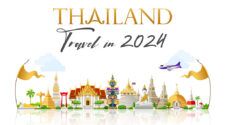
How to Travel to Thailand in 2024

Best Places to Retire in Thailand for Couples
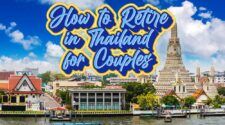
How to Retire in Thailand for Couples

Thai Privilege Visa RESERVE Membership
Leave a comment cancel reply.
Your email address will not be published. Required fields are marked *
This form collects your name, email and content so that we can keep track of the comments placed on the website. By submitting this form, you accepted and agreed on our privacy policy and terms .
2,085 Comments
Hello! I have a question! I got 3 doses, but the last one was in January. Is there an expiration date so I am not considered fully vaccinated again? Thank you! Greetings!

Dear Daniel,
You are considered fully vaccinated.
For more information about travel to Thailand, please check this link: https://www.siam-legal.com/legal-guide/how-to-enter-thailand-2022-guide.pdf
Excellent blog here! Also your web site loads up very fast! What web host are you using? Can I get your affiliate link to your host? I wish my website loaded up as quickly as yours lol 먹튀검증
“Thanks so much pertaining to giving everyone an update on this issue on your web-site. Thanks for your efforts and consideration of other people by making this blog available.” 토토
Why would anyone take an experimental vaccine.when 99.9% recovery..so sad to hear million dieing worldwide from the vaccine . I give travelling a miss
Hello, how many doses do i need to be considered fully vaccinated ? I got 3 doses up till now and my trip is on early october
2 doses is fully vaccinated.
When is the Covid-19 visa extension deadline? Can I still extend my Covid-19 visa?

The deadline was August 24, 2022.
Hi there, I’m traveling in Chiang Mai with my friend (He’s a Taiwanese living in Japan) and he got PCR tested positive today. His tourist visa expires the day after tomorrow and he has ticket to Japan on the same day. Japan requires him to be tested negative with certification.
Issues: – tourist visa is expiring – he cannot go to next destination because he has covid
any advice would be appreciated thank you.
Your friend can still get visa extension thru 3rd person. He/She need to be tested negative prior to continue his travel.
I arrived in Thailand a few days ago. I am not fully vaccinated, so I did an RT-PCR test in my country before departure. Now the result of the test is expired. I’m planning a flight from Bangkok to Phuket. Do I need to make a PCR test again in case of domestic flights in Thailand?
Hi Nicholson,
For domestic travel , it’s not necessary. Only upon entering Thailand.
Hi there, I’m a Filipino that entered Thailand with a visa exemption of 30 days. If I want to continue staying in Thailand as a tourist, do I have to apply for a tourist visa at the immigration office? How long can it be extended? And can it be done within Thailand? Thanks in advance for your help.
Hi Alicia ,
You can extend it for additional 30 days. Check this https://www.thaiembassy.com/thailand-visa/thai-visa-exemption-and-bilateral-agreement
Hello there,
Thank you for response. I would also like to ask if you were still requiring RT-PCR test for transit passenger. I had connecting flight there within an hour then I will fly to my final destination in Manila.
Yes, if unvaccinated.
I have a flight on Sept 18,2022 to Manila PH. I am a fully vaccinated OFW coming from Germany and had a connecting flight in Bangkok,Thailand within an hour then I will fly home bound to Manila. I would like to ask if you are still requiring Travel insurance,RT-PCR or Rapid test and if I still need to register on your Thailand health pass for Transit passenger like me. Hoping for your response. Thank you.
Hello Joana,
A health Insurance and the Thai Pass requirement for international/transit passengers will be lifted from 1 July, 2022 onwards. However, please check for the latest travel requirements with the airline and the country of your furthers destination.
I am currently in Phuket as tourist and I tested positive. What should I do?
If asymptomatic, make self isolation if with symptoms and severe admit yourself at nearest hospital. Your can do visa extension via third party.
Hi. I got in Thailand with 60-day tourist visa and later got my Non B working as a teacher. This visa expires end of September and I will no longer work for the company, but I would like to stay in the country. Do you think I should ask for a tourist visa (do I need to leave Thailand to do so?), or a covid visa extension if it’s still possible?
You can extend it for additional 30 days.
I am an Australian currently in Indonesia who will fly directly to Thailand to volunteer for an organisation for 60 days. Which visa can I apply for from Indonesia? Or should I arrive with the 30 days visa exemption and extend this to 60 days once I am there?
Yes, you can apply and do visa extension prior you finish your 30 days free visa.
Hi … I’m isolating in Bangkok due to contracting Covid. My Thai visa runs out today. I expect to get a negative PCR test result sometime next week. As soon as I get a negative result I wish to fly to Laos. Can I show the PCR test results to Immigration at the airport and deal with the overstay issues there before flying out to Laos?
Yes. To avoid penalty
Hi, Im Russian, Do I need to be vaccinated to enter Thailand, or PCR test is enough?
Hi Mustafa,
For easy entry, fully vaccinated is better, Just prepare your vaccination certificate and Passport. If unvaccinated, you need to have valid 72 hours RT PCR upon entry.
Hi, Me and my wife are trying to return to HK from Bangkok but we are struggling to find a quarantine hotel. We may have found one which is available from the 31st but our visa exemption expires on the 30th. How can we extend our visa exemption by a few days so we can travel on the 31st? Thanks
You can visit with the nearest immigration office o. You can also call our office +66 2 254 8900 and visit our website https://www.siam-legal.com/legal_services/thailand-visa-services.php for further assistance.
Currently staying in Bangkok
Here’s the address of our Bangkok office 18th Floor, Unit 1806 Two Pacific Place, 142 Sukhumvit Rd, Khlong Toei, Bangkok 10110, Thailand
Hi, I am unvaccinated, I will do the PCR test 72 hours prior to flight in Aug:
1. what is the procedure of my kid of 6 years old? 2. what if the PCR result of one of us result is positive? we are not allowed to fly, right? or we can fly but need to have the hotel of SHA+ for quarantine for 5 days? Thanks in advance
1. If you are unvaccinated and with children, both of you should have 72 hours RT PCR. 2. If the result is positive, you will be isolated at quarantine facility for a week . Better to secure your travel insurance with covid coverage in any case happen.
Hye. I’ve been looking for the latest requirement for transit in Thailand. I’m still not sure if I still need to have the insurance for 1hour+ transit in Thailand. Does anyone have answer for this? Thank you
Insurance is optional.
good afternoon, i have the complete vaccination and i have a trip to thailand on the 16th. the entry rules have changed today, it is still necessary to apply Thailand pass? And regarding travel insurance, is it still necessary? Thank you waiting for a reply
Thailand Pass is no longer required. Insurance is not mandated but still highly recommended.
Hi there one question arrive in Phuket, German with exemption 30 days is it still possible extend that for 30 days or will get only 7 days? can it be done in patong immigration or must go Phuket town immigration?
You can arrange your visa extension at Phuket immigration. You can also reach our office for assistance : +66 76 326 322
Hi .. My GM and Family [Qatari Nationals] Travelling to Thailand – Phuket on: 30 June [1-week stay] 2-Adults 18+[Fully Vaccinated] Is they needed PCR Test prior to their Travel Please…??
If adults are fully vaccinated, children can enter Thailand with the same procedure of adults as well.
Hi, can non-fully vaccinated traveller enter Thailand in June with a recovery certificate that is still valid for 3 months from the date tested positive, instead of taking a pro ART?
Also, is the test also required for domestic flights (eg. Bangkok to Phuket)?
Yes, you need a negative RT PCR within 72 hours of your flight. For domestic flights, no other requirements as long you successfully enter Thailand.
If I have been diagnosed with covid recently (less than 14 days) before my flight to Thailand, can I still enter Thailand? I have since recovered and am negative before departure and have also been fully vaccinated more than 14 days before entry.
Yes, bring your vaccination certificate and certificate of recovery.
Hi, I am flying from India to Hong Kong via Bangkok, with a 3-hour layover. The flight is this Saturday. My complete journey is booked on the same ticket.
Could you please confirm for me all the requirements I need to comply with for my layover?
A reply from you would be greatly appreciated! Thank you so much
If you will travel for the month of June and fully vaccinated, just covid insurance. But if you will recheck in your luggage at immigration for your next flight, you need to apply Thailand Pass.
Effective on July 1, Thailand Pass is not necessary and insurance is optional.
Where can I find all the information for people in transit at the international airport BKK-Suvarnabhumi Intl. in June 24?
Open the link for your guidance, https://www.thaiembassy.com/travel-to-thailand/covid-19-guide-for-travelers-in-thailand
I’ve entered thailand with a visa exemption for 30 days. Can I extend this by 60 days now or do I have to extend it by only 30 days first?
Hi Alexander,
If you will exceed with the granted visa exemption of 30 days, Yes , get visa.
We are a family of 5 transiting from Singapore to Bangkok then to Dubai. It’s a 4 hour layover. I hate the requirement to transit?
Hi Stephen,
If you will recheck in you baggage at immigration, apply for Thailand Pass and insurance. If no, just travel insurance with covid medical coverage of USD 10, 000
What is required if I am only transiting through Thailand? I am a US citizen. I am leaving Myanmar and traveling back to the United States. Myanmar requires everyone to have a negative PCR test to board the plane. Do I still need insurance or a Thai Pass if I am only passing through Thailand on an 8 hour layover?
Hi Monique,
If your flight details will be within the month of June, yes insurance is still required. If July 1st onwards, insurance is optional.
I am transiting through Bangkok (with through baggage) before landing in Japan. Is it right I need insurance even though it’s just a 2hr layover? I have vaccination proof, and will have a COVID test too of course. Is insurance necessary for the short layover? Thanks
Yes, you need insurance. Also, if you will recheck in your baggage at immigration, apply Thailand Pass.
I am travelling from Hong Kong to the UK with a layover of 10 hours in Bangkok. I will only stay in transit areas in BKK airport. I am vaccinated a year ago. I suppose I would need a negative PCR test result, may i ask if i also need medical insurance to travel via Thailand in this case? Thanks in advance.
Yes, travel insurance with covid coverage of USD 10,000 is required. If you will gonna recheck in your baggage at immigration, Thailand Pass is needed , if No, not necessary.
Hi Yordmanu, Thanks for getting back. Sorry may i confirm again if PCR test is needed if i am only in transit, given that i am vaccinated a year ago?
Thanks again!
No for layover it’s not necessary, just covid insurance if you will enter for this month of June 2022.
Hi, I have flight from Paris to Bangkok with Emirates on 03 Jul but it will only be transit as I will then go from Bangkok to Jakarta (Thai Lion) on few hours difference. Then on the way back on 23 Jul, I go from Jakarta to Bangkok but as the connecting flight from Bangkok to Hong Kong is more than 12 hours, I need to book overnight hotel. Note that I have to change airport as both airlines are different. What is my requirement for this specific case
Effective on July 1st, Thailand Pass will be removed and covid insurance is optional. Just bring you vaccination certificate.
It’s a very good content. I’m so happy that I learned these good things. Please come to my website and give me a lot of advice. It’s my website address. 토토사이트
Yes i am completely concurred with this article and i simply need say this article is extremely decent and exceptionally useful article.I will make a point to be perusing your blog more. You made a decent point yet I can”t resist the urge to ponder, shouldn”t something be said about the other side? 바둑이게임
You are so entrancing! I figure I haven’t actually examined anything indistinct at this point. It’s remarkable to discover somebody who has an admitted thought on this point. Genuinely, thank you for beginning this 바카라사이트
My family and I are travelling to Vietnam with a flight transfer in Bangkok airport for 2 hours later in June. Can you please advise what is now required to ensure no issues. My wife and myself are fully vaccinated with Certificate of vaccination and children are 13 and 11. Can you please advise what is needed and whether we need to complete the Thailand Pass application if we are not leaving the airport transfer area?
Your children can be enter with the same procedure of parents,(If you are fully vaccinated, that will be their procedure too). For Thailand Pass, just put their name under your application, there’s a button for additional there.
I will be travelling from Hong Kong with a stopover at Bangkok to EWR via Ethiopia Airline on about 16 August 2022. With reference to the statement below:-
Each passenger shall possess the complete set of documents which include: (1) Medical Certificate with a laboratory result indicating that COVID-19 is not detected, using RT-PCR method, which has been certified or issued no more than 72 hours before departure, OR certificate of vaccination showing that the last dose was administered no less than 14 days before the date of departure.”
Is it correct that RT-PCR is not needed so long I can present certificate of vacccination?
Dear Simon,
Yes, you are correct. Proof of Vaccination is enough. You do not need to do any COVID test. Thank you.
I am travelling to Pakistan from Hong Kong Via Thai Airways. I have a transit in Bangkok for 5 hrs and my baggage is mentioned to be checked through. I will not leave the airport restricted area during the waiting hours. Do I still need to buy travel insurance? I am fully vaccinated and might not require Thailand Pass as well.
If you will not recheckin your baggage for your next flight, just obtain travel insuourance with covid medical coverage.
We are flying from Melbourne to Thessaloniki (Greece) via Istanbul and Bangkok, departing 16 June 2022. Transit at Bangkok Airport will be on 16 June for about 3.5 hours.
We are a family of four.
Two adults having received two doses and two children (12 & 9) that have not been vaccinated yet but have had COVID a few months ago.
Q1: Do we all need to have a PCR Test for transit via Bangkok?
Q2: Are there any issues with the children not being vaccinated?
Children will have a same process with their parents. If they got covid, bring certificate of recovery.
Hello, I am flying from Kazakhstan to Malaysia with a transit in Phuket. What documents will I need?
Apply for Thailand Pass, if your travel time will be on the month of June.
I am flying from London to Sydney via Zurich and Bangkok, departing 10 February 2022. Transit at Bangkok Airport will be on 11 February for about 2 hours.
To transit, I know that I will need evidence of medical insurance. I will also have a proof of vaccination certificate.
Do I also need a PCR test result in addition to the vaccination certificate ? Or is the certificate good enough for transit ?
Yes, you will be needing Medical Certificate with a laboratory result indicating that COVID-19 is not detected, using RT-PCR method, which has been certified or issued no more than 72 hours before departure. Thank you.
I have two questions:
1. If I recently have been infected by COVID-19 and my PCR test prior to departure is positiv, can I use the certificate of recovery instead? I understand that the certificate of recovery is accepted if the test nr. 1 at the arrival in Thailand is positive, but what if the test in Denmark (my home country) is positive prior to take off?
2. Is it possible to travel by flights within Thailand (flight from Bangkok to Phuket) between the test on day 1 and day 5?
First, for those previously infected you must present a valid COVID-19 recovery form or medical certificate certifying that you have recovered from COVID-19 within 3 months before traveling or are asymptomatic in case your COVID- 19 RT-PCR test shows a positive result. If you’ve been tested positive prior to take off you must contact your airlines if what requirements you should bring with you. Second, Yes you can travel once you have your negative test result on your Day 1. Thank you.
Will the covid amnesty visa will renewed after 25th January?
Yes, it has been continued until March 25, 2022. Thank you.
Is Thai pass needed for transit via Bangkok(flying on Feb 6th from chennai to sydney with 1:30 hrs transit in Bangkok)?
You only need RT PCR test result and insurance. Thank you.
I have been approved via THailand Pass for entrry in January 2022. I recently recovered from COVID, but my PCR test is likely to still come back positive. Am I granted entry into Thailand with appropriate medical documentation of recovery? Will I still be required to take a PCR test upon arrival?
Dear Shannon,
Good day. You can still use your Thailand Pass to travel to Thailand however, you must also test negative in the RT-PCR test because you cannot board the flight if you tested positive, the airline will not allow you. Thank you.
Vietnam is open..we all plan to go there..no need for anything
Effective on July 1, Thailand Pass will be removed. Just bring your vaccination certificate, and the insurance is optional.
Is the 60 day covid 19 visa extension still possible at the immigration? Do I need any embassy letter or other document?
Yes, it is still possible to request for the extension under COVID. You can do this extension and visit immigration office until January 25, 2022. Thank you.
Hello, I am from the Philippines and I have parents working in Thailand. Would I still need to apply for a Thailand pass and undergo quarantine?
Dear Iszach,
Good day. Yes, you still need a Thailand Pass to be able to enter Thailand. If you are fully vaccinated, you can do a test and go program. For more information, please visit: https://www.thaiembassy.com/travel-to-thailand/thailand-pass Thank you.
Hello, I am just checking to see if we qualify for the Phuket Sandbox. My husband, daughter and I are Canadian diplomats currently residing in Malaysia. We would be 2 weeks post fully being vaccinated come August 1 when we would like to travel to Phuket and stay 8 days (not planning to leave the Island). I know we need the Visa, Covid Tests and insurance, but my question is, if we are Canadian but leaving from Malaysia would we be able to take advantage of the sandbox or do we need to be coming from Canada. We would be able to take a direct flight from Malaysia to Phuket.
Dear Kim, Good day. Both Malaysia and Canada are not low risk or medium risk countries per publication of the Ministry of Public Health. So you cannot qualify for the Phuket Sandbox program even if you are vaccinated or you only stay for 8 days. But that will change, perhaps middle of July or end of July, Malaysia will be considered medium or low risk at that time of your travel. Thank you.
Will the Phuket Sandbox allow people to enter without quarantine on a non-immigrant B visa? If not, is it possible to convert the Tourist Visa (or visa exemption if possible) to a non-Immigrant B without leaving Thailand? I am a US citizen,
Dear Chas, Good day. Yes, any person with Visa Exemption, TR visa or Non B visa can enter Phuket as long as you have COE and you have been vaccinated starting July. You must enter Phuket internationally through Singapore, Doha or Dubai (not through Bangkok). You must also stay in an accredited hotel for at least 7 days. You can travel around the island of Phuket during these seven days. Thank you.
If i have a non-immigrant B visa, can I purchase health insurance good for only 1 month?
Dear Ariane, Good day. For those arriving in Thailand or entering Thailand, the required validity of your COVID Insurance, it must cover the whole duration of your stay. So if your Non B visa is valid for 90 days, you must purchase at 90-day COVID insurance . If the validity is 6 months, you must also buy 6 months insurance. Thank you.
What if upon arrival in Thailand my visa is only valid for 1 month, it means I only have to buy the health insurance for a month?
Dear Ariane, Yes, you need to buy 1 month COVID 19 insurance and also provide an exit flight that coincide with the expiry of your visa or expiry of the insurance policy. Thank you.
Hi Rex Pls let me know how many night and day to stay quarantine. Bc I saw some hotel packages are 15nights & 16days but some is 14nights & 15days. thanks,
Dear Minge, Good day. The minimum requirement is 14/15 days. It depends on the hotel you have chosen. Some hotels are required by MOPH to offer 15 days or 16 days and some hotels are only required to have 14 days. Just choose what the hotel is offering as a package. You cannot request a hotel to lower it 14 days if they are offering 15-day package. You can choose another hotel that offers 14-day package if you want that package. There’s more than 130 ASQ hotels in Bangkok. Thank you.
Hi. I have e – Tourist visa for 60days. I want to expand tourist visa for more 30days. Were I have to go to do it Bangkok 1. Immigration Bureau? 2. Immigration division 1? Or in all this places i can expant my visa?
Dear Viktorija,
Good day. You can apply for the 30-day extension at any immigration office in Thailand. If you are residing or currently staying in Bangkok, you need to visit the Muang Thong Thani Satellite Immigration office. Thank you.
What are my chances of getting another visa extension after being able to extend my TR visa twice? First, I was granted 30 days extension then the immigration officer offered 60 days extension due to Covid ending on June 27, 2021. When the Covid outbreak worsen in the Philippines last April, Philippine government set a policy to only allow 1500 inbound passengers prompting the airlines to limit their flights. When am about to fix my flight after being cancelled, I learned that Philippine Airlines had already closed their flights for the month of June and July. I have no clue how my visa extension will come out when i apply for the third time and that’s what i worry about.
Dear Chris, Good day. Please check with us in June about the COVID extension if it is extended or not. Right now, this program is only available until May 29th. Let’s see if you can extend it again in June. I recommend for you to call PAL to book a flight in June. Thank you.
I am in Bangkok and due to fly back to the Philippines on June 30. My visa though is only until June 27 and while i plan to apply for extension given that i already had two visa extensions, I am not too certain if i will be accommodated. This time if possible, to be allowed to stay for 3 days, just until my flight is sufficient. I just dont want to have a record that i overstayed.
Dear Chris, If you have no plan to return to Thailand for good, you can overstay for 3 days and pay the overstay fine at the airport. If you have plans to return to Thailand after your trip in the Philippines and returning as tourist, then we recommend for you, not to overstay even for a single day. Thank you.
Dear Chris, I have travelled to Thailand , got my COE and finished my quarantine. I need to fly to China for work. Now the visa office informed, I need to stay in Thailand for more than 2Months, befire they can issues my visa. What am I to do now?
Dear Lizette, Good day. You can apply for the COVID 19 extension at any immigration office. This will give you 60 days stay from the date of application. So I recommend to go to immigration office when your current visa or permit to stay is expiring. Thank you.
Can you please inform me what a good website is for updated travel restrictions within Thailand?
Dear Uschi, Good day. Yes, you can definitely check this page: https://www.thaiembassy.com/travel-to-thailand/thailand-travel-restrictions You may also sign up for our weekly updates. Thank you.
It didnt come easy. PAL rejected my requests couple of times but am happy to inform you that I was finally accommodated on their June 30 flight. My only worry now is my visa expires 3 days earlier than my flight. I dont want to have any record of overstaying. Just want to consult if you think Thai Immigration would grant me at least 3 days visa, just up until my flight. Am praying hard now that my flight wouldn’t get cancelled anymore. Thinking about my situation is giving me unnecessary stress.
Thank you in advance for being available and sharing your expertise.
Dear Chris, I am not sure if you are in Thailand now or are you already in the Philippines. If you are already in the Philippines and your flight to Thailand is June 30th and your Thai visa is until June 27th, you will not be able to get a COE based on that visa. You may have to get a COE based on visa exemption. Thank you.
Hi, I will be flight to Bangkok on 1 May and already get the ROC approval from the Hong Kong Thai Embassy, however, the flight schedule no was changed but on the same date of arrival, I tried to log in to amend the ROC but iot showed that it was approved which cannot be amended any information, may I know that how should I do ? is it necessary to amend the flight NO
Dear Ben, Good day. The COE has the remarks number stating that if your flight was canceled or delayed and you have a new flight within 72 hours from the original flight and all your other documents are updated, you can use the same COE. Thank you.
Hi I was going to fly Thailand on apr 20th but it turns out i am Covid positive. I have to stay isolated 2 weeks at home. What are the requirements for people that has already Covid? You know PCR remains positive even if you can not transmit the illness… Should I quaratine? Thanks
Dear Fabian, You can travel to Thailand only when you test negative. People who recovered from COVID 19 will test negative afterward. That is the way to say they have recovered. Thank you.
Hi Fabian, what ended up happening in your situation. Were you allowed to enter with a certificate of recovery or did you have to wait until you tested negative?
Hi .. i just want to ask .. My friend want to travel in DUBAI UAE .. right now shes in thailand did bnkok thaild requires 100,000 usd for health insurance even she will do exit in the country? And she have already travel health insurance here in dubai .. hope u will answer my question . Thanks
Dear Mariel, A Thai national does not need a travel insurance when she returns to Thailand. If your friend is not Thai and she will return to Thailand, she needs to have 3 to 6 months COVID insurance for Thailand. Thank you.
My husband plans to travel this May, he is a dialysis patient does ASQ hotels provide dialysis treatment for 2 days? He is done with his covid vaccine.
Dear Mae, Good day. I recommend for you to contact with the ASQ Hotel if they can arrange this special request. They might be able to arrange it with the partner hospital. Thank you.
I’m married to a Thai national but I reside in the UK (I’m British), my wife is in Thailand (Isaan). I’m hoping to travel out there in October this year 2021 and would like to ask, will I be permitted to travel to Isaan to see her and spend a few weeks there?
Thanks Andre
Dear Andre, Good day. Yes, you will be permitted to see your family in Isaan. if you are staying less than 45 days in Thailand, you may opt to get the visa exemption of 45 days which you may extend for 30 in Thailand. You only need to apply for the COE or certificate of entry from the Thai Embassy. The main requirements are bank statement, return flight within 45 days, ASQ hotel booking for the quarantine of either 7 or 10 days, COVID 19 travel insurance for Thailand and the COVID test before your flight. The processing time for the COE will take a couple of days.
You may download our Free Guide on How to Enter Thailand on this link: https://www.siam-legal.com/legal-guide/how-to-enter-thailand-2021-guide.pdf Thank you.
My Mom is a Thai citizen will she have to self isolate at the hotel or we can self isolate ourselves at home? Because we have not enough money to pay that hotel fee for 14 days. What should we do?
Dear Jimmy, For the Thai national, when applying for the COE to return to Thailand, you will be given an option to quarantine in a hotel paid by yourself or quarantine in the facility provided by the government (usually it is a hotel classroom or a hotel also). No, you cannot quarantine at home. You must do it in designated areas for 10 days. Thank you.
Hi, Can i convert my non immigrant o type visa into non-immigrant B type visa without leaving Thailand? Is there any relaxation in this case due to covid?
Dear Vishakha, Good day. At this time, if your non immigrant O visa is a dependant visa or guardian visa or volunteer visa, it is not possible to change it into a Non Immigrant B visa within the country. If it is a Non O visa under retirement or under marriage visa, there will be a possibility that it can be changed into a Non Immigrant B visa at Bangkok Immigration office. Thank you.
My mum is a Thai resident living in England, my sister and I are British citizens. We’ve had bad news about a family member and we are desperate to go over as soon as possible this would not be for tourism, strictly personal agenda. What can we do?
Dear Alex, Good day. You may enter Thailand under visa exemption. Please check this page as your guide on how you can travel to Thailand right now: https://www.thaiembassy.com/travel-to-thailand/how-to-travel-to-thailand-in-2021 Thank you.
Hi there, I am a visitor from Indonesia, and I entered Thailand under the 45 day visa exemption scheme. I just finished my quarantine and plan to extend my duration of stay beyond the original 45 days. Is that possible? And what are the requirements?
Dear Lisa, Yes, you may visit the local immigration office and you may apply for a 60-day COVID 19 extension and pay 1900 THB. Thank you.
No more 7-day quarantine as Thailand encourages vaccinated tourists to return

Jan 20, 2022 • 4 min read

Thailand is resuming its quarantine-free entry program for international visitors ©Getty Images
Thailand is resuming its Test-and-Go tourism plan from February, which means that fully vaccinated visitors can bypass seven-day quarantine and travel to any part of Thailand, provided they take a negative COVID-19 test on the first and fifth day of their visit.
Fully vaccinated tourists from 63 countries, including United States, the United Kingdom, Australia, Canada, Ireland, Germany, China, Singapore, Spain, France, Italy, the United Arab Emirates, and Malaysia, can soon avail of the Test-and-Go program again after the government suspended it in December due to the uncertaintity surrounding the Omicron variant.
The (almost) quarantine-free entry Test-and-Go plan requires fully vaccinated arrivals to have COVID-19 insurance cover of at least US$50,000 (£36,600), and present proof of a negative COVID-19 PCR test before they depart for Thailand.
New applicants for the Test-and-Go program are also required to undergo two additional COVID-19 tests upon arrival and must, at their own expense, spend the first night and fifth night in Thailand quarantining at a government-approved hotel while awaiting their results (COVID-19 test results can take about 24 hours to be processed). Tourists must stay in their room while awaiting the result. But once the result is negative, tourists will be free to move and travel around Thailand much in the same way that any Thai citizen can.
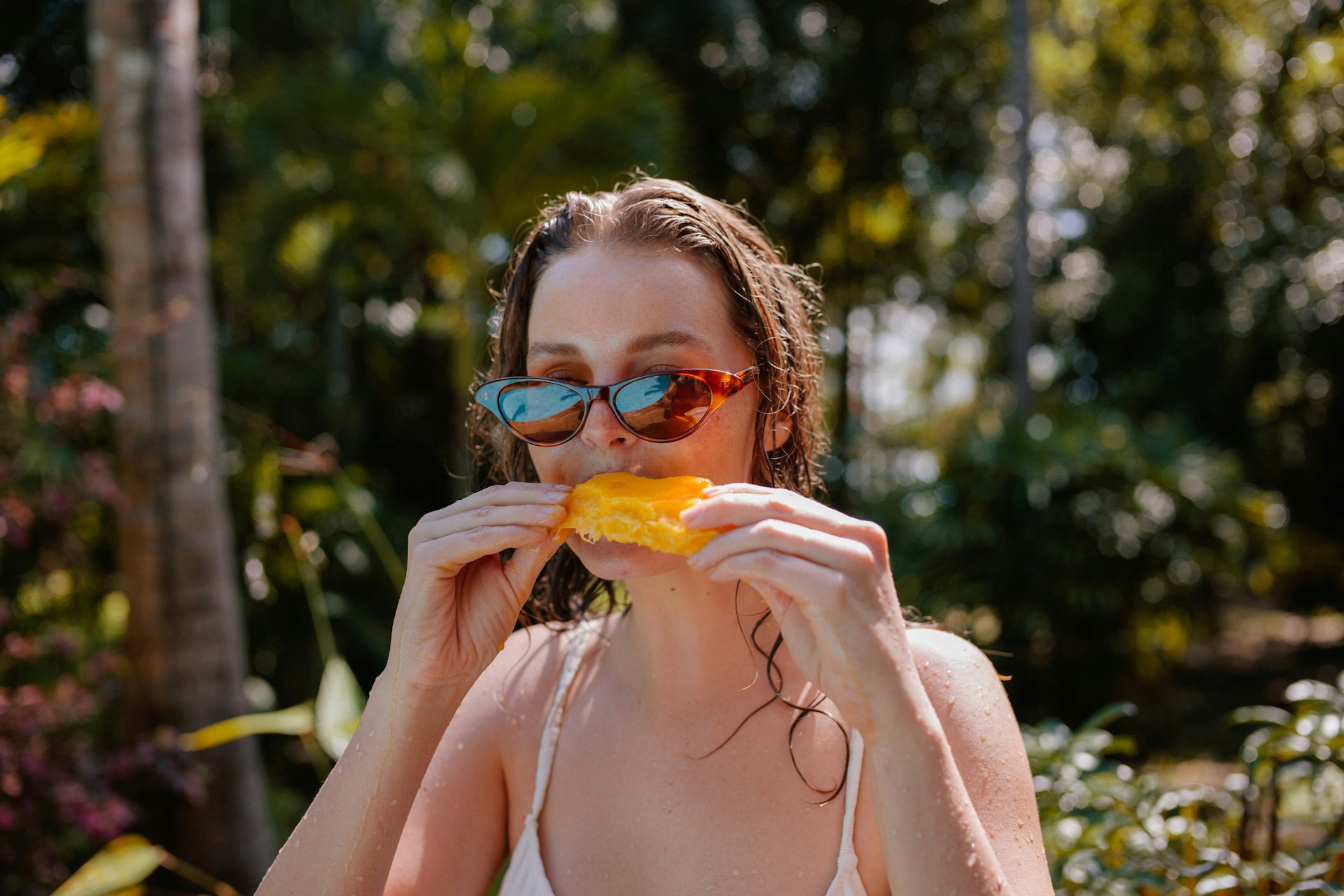
Anyone who applied for the Test-and-Go program before December 22 and received their QR code is required to take their test on day five and six instead.
Government spokesperson Taweesilp Wisanuyothin told reporters, via The Bangkok Post , that the Test-and-Go program can resume on February 1 now that the Omicron peak has passed. The tourism program will be kept under review though, along with the Sandbox program (Thailand's first phase of its return to tourism which allows fully vaccinated visitors from any country to travel to approved locations such as Phuket , Krabi and Ko Pha-ngan for at least seven days before being free to travel around Thailand).
"In case there are more infections or the situation changes, there will be a re-assessment for inbound travellers and adjust toward the Sandbox scheme," Wisanuyothin said.
Travelers are also required to download the MorChana app , a tracking app where they will be reminded to take another antigen test on day five. Travelers under the age of 12 are exempt from vaccination requirements but they will be required to undergo testing.
Unvaccinated travelers in Thailand
People who are not vaccinated can also visit Thailand under the country's Alternative Quarantine program . They must apply for a Thailand Pass and travelers over the age of six must take a negative pre-departure COVID-19 test no more than 72 hours before traveling. They'll also have to have an insurance policy with at least US$50,000 coverage and pay for their quarantine accommodation before traveling to Thailand, as well as their PCR tests.
Travelers who are fully vaccinated with an approved dose (or at least one dose for travelers under the age of 18) are required to quarantine for seven days and take two PCR tests. Travelers who are not fully vaccinated must quarantine for 10 days and take three PCR tests. When they quarantine period is over, travelers will be free to travel around Thailand.
Read more: Full Moon Party or peaceful paradise? Thailand has a beach for you

Thailand entry fee
Meanwhile, Thailand is considering introducing a tourist fee of 300 baht ($9/£7) in April, though it has yet to be approved. If introduced, the charge would be applied to all international tourists, regardless of where they are coming from and included in their airfare.. According to Thailand's tourism ministry , the revenue generated from the fee would be used to fund the sustainable management of Thailand's tourism resources, in addition to covering accident insurance for tourists who can't afford it.
"We've encountered times when insurance didn't have coverage for tourists... which became our burden to take care of them," the country's tourism minister, Yuthasak Supasorn, told Reuters .
Thailand continues to categorize provinces into dark red, red and orange zones based on their COVID-19 risk, with varied restrictions in place across each zone. Check the latest advice for the area you are traveling to before departure. Face masks are compulsory across Thailand and must be worn in indoor and outdoor public places and on public transport.
You might also like: The quickest, easiest and most affordable ways to get around in Thailand You won't believe the views on these 9 iconic Thailand hikes Bali is now open to international travelers from these countries
This article was first published Oct 20, 2021 and updated Jan 20, 2022.
Explore related stories

May 12, 2022 • 2 min read
It's one of Southeast Asia's most isolated countries but after more than two years of border closures, Laos has opened up to all international tourists…

Mar 8, 2022 • 2 min read

Mar 3, 2022 • 9 min read
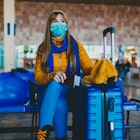
Jan 21, 2022 • 4 min read
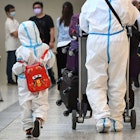
Nov 30, 2021 • 6 min read

Nov 15, 2021 • 2 min read
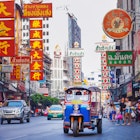
Sep 27, 2021 • 3 min read
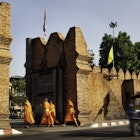
Apr 19, 2024 • 7 min read

Apr 8, 2024 • 6 min read
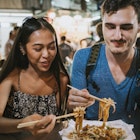
Feb 23, 2024 • 7 min read

Thailand Will Ease Entry Requirements for Vaccinated Travelers in March
Vaccinated visitors will still need to submit to two covid tests postarrival, but the second one can be a self-administered rapid antigen test instead of a pcr..
- Copy Link copied

Starting March 1, it will get a little easier to visit Thailand.
Photo by sapikusan / Shutterstock
Thailand will ease some entry requirements for foreign visitors as it balances a rising number of coronavirus cases with the need to rebuild its pandemic-damaged economy, the government announced Wednesday, February 23.
Beginning March 1, 2022, fully vaccinated visitors must take an RT-PCR test on arrival and spend their first night at an approved hotel while awaiting the results, but will no longer need to take a second RT-PCR test and spend another night at a hotel on their fifth day, the Center for COVID-19 Situation Administration said.
Instead, visitors arriving under the “Test & Go” program will need to take a self-administered rapid antigen test on the fifth day and report the result on a cellphone app.
The center, headed by Prime Minister Prayuth Chan-ocha, also reduced the minimum required health insurance coverage for COVID-19 treatment from $50,000 to $20,000 for each foreign entrant.
Spokesperson Taweesin Visanuyothin said the changes took into consideration the need to boost the economy even as cases of the Omicron coronavirus variant rise. Thailand relies on tourism for as much as 20 percent of its GDP.
A total of 21,232 new confirmed cases and 39 deaths were announced Wednesday, although the number does not include many results found with antigen tests.
Thailand has reported 2.77 million coronavirus cases since the pandemic started in 2020. Nearly 550,000 cases, or around 20 percent of the total, were reported during the first two months of this year.
Taweesin said the death toll compared to the number of confirmed cases this year is as low as 0.19 percent, and that was one of the main factors behind the decision to ease entry requirements. Also, most new COVID-19 cases have been found among local residents, not foreign tourists.
There are currently 173,605 active cases, including 882 categorized as serious, being treated in hospitals and field hospitals. In addition, there are 21,120 cases in community isolation centers and 47,373 in home isolation registered in the public health system. Bangkok, the hardest-hit province, will add more beds for patients with mild symptoms, Governor Aswin Kwanmuang said.
Unvaccinated travelers can also enter Thailand if they are quarantined in approved hotels for 10 days.
Almost 500,000 visitors entered Thailand by air from the beginning of the year through February 21, Taveesin said.
>> Next: AFAR’s Ultimate Guide to Thailand

We’re sorry, this site is currently experiencing technical difficulties. Please try again in a few moments. Exception: request blocked
Thailand Travel Restrictions
Traveler's COVID-19 vaccination status
Traveling from the United States to Thailand
Open for vaccinated visitors
COVID-19 testing
Not required
Not required for vaccinated visitors
Restaurants
Recommended in public spaces.
Thailand entry details and exceptions
Documents & additional resources, ready to travel, find flights to thailand, find stays in thailand, explore more countries on travel restrictions map, destinations you can travel to now, dominican republic, netherlands, philippines, puerto rico, switzerland, united arab emirates, united kingdom, know when to go.
Sign up for email alerts as countries begin to open - choose the destinations you're interested in so you're in the know.
Can I travel to Thailand from the United States?
Most visitors from the United States, regardless of vaccination status, can enter Thailand.
Can I travel to Thailand if I am vaccinated?
Fully vaccinated visitors from the United States can enter Thailand without restrictions.
Can I travel to Thailand without being vaccinated?
Unvaccinated visitors from the United States can enter Thailand without restrictions.
Do I need a COVID test to enter Thailand?
Visitors from the United States are not required to present a negative COVID-19 PCR test or antigen result upon entering Thailand.
Can I travel to Thailand without quarantine?
Travelers from the United States are not required to quarantine.
Do I need to wear a mask in Thailand?
Mask usage in Thailand is recommended in public spaces.
Are the restaurants and bars open in Thailand?
Restaurants in Thailand are open. Bars in Thailand are .
Travel to Thailand is about to get easier for vaccinated tourists
BANGKOK — Visitors vaccinated for COVID-19 will no longer need a test before traveling to Thailand starting April 1, health officials said Friday.
Visitors will still need to take a RT-PCR test upon arrival and a self-administered rapid antigen test on the fifth day in the country, said Taweesin Visanuyothin, a spokesperson for the government’s Center for COVID-19 Situation Administration.
Thailand is keen to restore its lucrative tourism sector, which took a nosedive when most arrivals from overseas dried up since April 2020.
Neighboring Cambodia, whose tourism industry was similarly battered, announced Thursday that fully vaccinated passengers are no longer required to have a RT-PCR test before arrival. It also removed the need for a rapid antigen test upon arrival.
TRAVEL TO THAILAND: Thailand easing entry requirements in March despite rising COVID-19 cases
Learn more: Best travel insurance
Coronavirus cases in Thailand
Thai health authorities are currently coping with record numbers of daily COVID-19 cases and related deaths this year.
There were more than 50,000 new cases reported Friday, slightly more than half confirmed by RT-PCR tests, and the remainder with rapid antigen tests. There were also 80 new deaths.
Since the pandemic started in 2020, Thailand has had a total of around 3.3 million confirmed cases and 24,075 deaths.
The health authorities are concerned about the potential for the spread of the virus next month during the Songkran festival , a raucous holiday that celebrates the Thai New Year.
They have prohibited the traditional splashing of water in the streets and other public areas and banned the selling and consumption of alcohol at public celebrations.
TRAVEL TO SOUTH KOREA: South Korea to allow fully vaccinated travelers to visit without a quarantine period
CANADA EASES ENTRY REQUIREMENTS: Canada to drop COVID testing requirement for vaccinated travelers
A major threat from the holiday is mass travel from the cities to home villages in rural provinces. The practice was a huge problem last year, when most Thais had not yet been vaccinated.
Thailand has administered 126 million doses of COVID-19 vaccines. At least 54.6 million people, more than 78% of the population, have been vaccinated with at least one jab. Fifty million people have received at least two jabs, and 22 million received booster doses.
- Search Please fill out this field.
- Manage Your Subscription
- Give a Gift Subscription
- Newsletters
- Sweepstakes
Thailand to Drop More COVID-19 Restrictions for Travelers — What to Know
Starting May 1, the Southeast Asian country will no longer require vaccinated visitors to get tested before arrival or during their trip or quarantine.
:max_bytes(150000):strip_icc():format(webp)/alison-fox-author-pic-15f25761041b477aaf424ceca6618580.jpg)
Thailand will eliminate pre-arrival testing for all visitors next month as the country becomes the latest to ease pandemic-related restrictions.
Starting May 1, the Southeast Asian country will no longer require visitors to get tested before coming or upon arrival, regardless of their vaccination status, according to the Tourism Authority of Thailand . While fully vaccinated travelers will be able to come into the country and travel freely without any quarantine restrictions or mandatory hotel stays, the rules will be slightly different for unvaccinated travelers.
Visitors who are not fully vaccinated and arrive without a negative COVID-19 test will be required to book a minimum 5-day stay in an approved hotel, quarantine, and get tested with a PCR test on day 5 of their trip. Alternatively, unvaccinated travelers may skip quarantine and travel freely throughout Thailand if they arrive in the country with a negative COVID-19 PCR test taken within 72 hours of their trip.
All travelers to Thailand must still register for a Thailand Pass online and obtain an insurance policy with a minimum coverage of $10,000, which is less than the previous requirement of $20,000.
Before May 1, vaccinated international visitors must pay for at least one night in a government-approved hotel, take a PCR test upon arrival, take a rapid antigen self-test on day 5 of their trip, and obtain an insurance policy with at least $20,000 in coverage. Thailand eliminated the pre-arrival test for vaccinated travelers earlier this month.
Thailand first started welcoming international tourists quarantine-free as part of its Phuket Sandbox program in July 2021, but required them to remain on the island. In November, Thailand then allowed tourists to visit the rest of the country quarantine-free , but tightened border restrictions again in December amid the emergence of the omicron variant.
In February, the country once again brought back its "Test & Go Thailand Pass" program , allowing vaccinated international visitors to travel to any part of the country and skip quarantine.
Thailand joins several other countries around the world in eliminating pandemic-related measures for vaccinated visitors, including Canada and Australia , which each dropped pre-arrival testing for vaccinated travelers. Some destinations have taken it even further, eliminating pandemic-era travel rules altogether, regardless of vaccination status, including Iceland , Ireland , the United Kingdom , and Aruba .
Alison Fox is a contributing writer for Travel Leisure. When she's not in New York City, she likes to spend her time at the beach or exploring new destinations and hopes to visit every country in the world. Follow her adventures on Instagram .
Related Articles
Thai Destination
Update to Covid-19 vaccine guide for travellers to Thailand
The tourism authority of thailand (tat) on monday provided an update to guide to covid-19 vaccines for international travellers to thailand effective from december 16, 2021..
International travellers, including returning Thais and foreign residents, who are above 18 years of age should get fully vaccinated for Covid-19 with a vaccine approved by Thailand’s Ministry of Public Health (MoPH) or the World Health Organisation (WHO) no less than 14 days before their travel date.
Travellers 12-17 years of age, travelling with parents under the Test & Go entry scheme and Sandbox Programme, are not required to be vaccinated but must have a negative RT-PCR test result within 72 hours before travelling. Those unaccompanied must get vaccinated with at least one dose of an approved vaccine and must have a negative RT-PCR test result.
Travellers 6-11 years of age, travelling with parents under the Test & Go entry scheme and Sandbox Programme, must have a negative RT-PCR test result within 72 hours before travelling.
Travellers under 6 years of age, travelling with parents with a negative RT-PCR test result within 72 hours before travelling, are not required to have a pre-arrival negative RT-PCR test result and can have saliva test when entering the Kingdom.
Travellers previously infected within 3 months before travelling must have a medical certificate of recovery or get vaccinated with at least one dose of an approved vaccine for an unspecified period of time before travelling.
List of approved Covid-19 vaccines
Currently, the MoPH has approved the following manufacturers and vaccines:
- CoronaVac by Sinovac Biotech Ltd – 2 doses needed / 2-4-week interval;
- AstraZeneca or Covishield by AstraZeneca and the University of Oxford, SK Bioscience (South Korea), Siam Bioscience, and Serum Institute of India (Covishield) – 2 doses needed / 4-12-week interval;
- Pfizer–BioNTech or Comirnaty by Pfizer Inc. and BioNTech 2 doses needed / 3-week interval;
- Janssen or Janssen/Ad26.COV2.S by Johnson & Johnson Services, Inc. – 1 dose needed;
- Moderna by Moderna Inc. – 2 doses needed / 4-week interval);
- Sinopharm or COVILO by Sinopharm Co., Ltd. – 2 doses needed / 3-4-week interval);
- Sputnik V by the Gamaleya Research Institute of Epidemiology and Microbiology – 2 doses needed – 3-week interval).
Meanwhile, the WHO’s guidance on the Covid-19 vaccines is available here .
Have you been fully vaccinated?
According to the MoPH, travellers are considered fully vaccinated if:
- They get their second dose of a 2-dose vaccine; such as, the AstraZeneca or Pfizer vaccines, no less than 14 days before their travel date to Thailand.
- They get a single-dose vaccine; such as, Janssen vaccine, no less than 14 days before their travel date to Thailand.
- In case of mix-and-match vaccines, travellers should get their second dose of a different vaccine within the recommended interval of the first vaccine no less than 14 days before their travel date to Thailand. For example, if the first vaccine is CoronaVac from Sinovac Biotech and the second vaccine is AstraZeneca, the time between the two doses is 2-4 weeks.
Travellers who do not meet these criteria may be denied entry into Thailand.
Requirements for the ‘Certificate of Covid-19 Vaccination’
The travellers’ Certificate of Covid-19 Vaccination should contain the following details:
- Given name and last name;
- Date of Birth;
- Nationality;
- Passport or Identification No.;
- Name of the Covid-19 vaccine;
- Vaccination dates;
- Vaccine manufacturer and lot/batch number;
- Authorised organisation in the country of origin.
In addition to being fully vaccinated, international travellers should have all of their advance arrangements in good order for arrival and entry. For more information on Thailand’s reopening programmes, see: https://www.tatnews.org/thailand-reopening/ .
MOST VIEWED
Srettha following thaksin’s lead to boost popularity, say observers, farmers urged to postpone cultivation as pasak dam has low water, family of fatal fall victim threatens legal action, thai exports in march drop 10.9% year on year, techsauce reveals strategy to make thailand tech, innovation hub.
Cookies on GOV.UK
We use some essential cookies to make this website work.
We’d like to set additional cookies to understand how you use GOV.UK, remember your settings and improve government services.
We also use cookies set by other sites to help us deliver content from their services.
You have accepted additional cookies. You can change your cookie settings at any time.
You have rejected additional cookies. You can change your cookie settings at any time.
- Passports, travel and living abroad
- Travel abroad
- Foreign travel advice
Entry requirements
This advice reflects the UK government’s understanding of current rules for people travelling on a full ‘British citizen’ passport from the UK, for the most common types of travel.
The authorities in Thailand set and enforce entry rules. If you’re not sure how these requirements apply to you, contact the Royal Thai Embassy in the UK.

COVID-19 rules
Countries may restrict travel or bring in rules at short notice. Check with your travel company or airline for changes.
If you test positive for COVID-19, you may need to stay where you are until you test negative. You may also need to seek treatment there.
You should also read TravelHealthPro’s general COVID-19 advice for travellers .
Travel to Thailand
If you are visiting Thailand and then travelling to a country that requires an RT-PCR test for entry, you will need to buy medical insurance that covers COVID-19 treatment before you arrive in Thailand.
Passport validity requirements
Your passport must be valid for at least 6 months from when you enter Thailand.
You could be refused entry to Thailand if your passport is damaged or has pages missing.
If you’re a dual national, to avoid problems at immigration, you must leave Thailand on the same passport you used to enter.
If you need to renew or apply for a new British passport, see overseas British passport applications .
Visa requirements
British passport holders arriving by air or land can enter Thailand for 30 days without a visa (visa exemption).
If you intend to stay longer (for work, study or other reasons) you need a visa before you travel.
For more information on visas or entry requirements, contact the Royal Thai Embassy or local Immigration Office.
Overstaying your visa
If you stay beyond the period of your visa, you will be fined 500 Thai baht a day up to a maximum of 20,000 baht. You risk being:
- held in detention
- deported at your own expense
- banned from re-entering Thailand for up to 10 years
Conditions in detention centres can be harsh.
Vaccination requirements (other than COVID-19)
At least 8 weeks before your trip, check the vaccinations and certificates you need on TravelHealthPro .
Depending on your circumstances, this may include a yellow fever vaccination certificate.
Customs rules
There are strict rules about goods that can be brought into and taken out of Thailand . You must declare anything that may be prohibited or subject to tax or duty.
Importing cigarettes
It is illegal to import more than 200 cigarettes per person into Thailand. This is enforced at customs on arrival. If you go over the limit, you could be fined 10 times the value. Your cigarettes will likely be confiscated.
Related content
Is this page useful.
- Yes this page is useful
- No this page is not useful
Help us improve GOV.UK
Don’t include personal or financial information like your National Insurance number or credit card details.
To help us improve GOV.UK, we’d like to know more about your visit today. We’ll send you a link to a feedback form. It will take only 2 minutes to fill in. Don’t worry we won’t send you spam or share your email address with anyone.
Update April 12, 2024
Information for u.s. citizens in the middle east.
- Travel Advisories |
- Contact Us |
- MyTravelGov |
Find U.S. Embassies & Consulates
Travel.state.gov, congressional liaison, special issuance agency, u.s. passports, international travel, intercountry adoption, international parental child abduction, records and authentications, popular links, travel advisories, mytravelgov, stay connected, legal resources, legal information, info for u.s. law enforcement, replace or certify documents.
Share this page:
Thailand Travel Advisory
Travel advisory july 24, 2023, thailand - level 1: exercise normal precautions.
Reissued with obsolete COVID-19 page links removed.
Exercise normal precautions in Thailand. Some areas have increased risk. Read the entire Travel Advisory.
Reconsider travel to:
- Yala, Pattani, Narathiwat, and Songkhla provinces due to civil unrest associated with ongoing insurgent activities.
Read the country information page for additional information on travel to Thailand.
If you decide to travel to Thailand:
- Enroll in the Smart Traveler Enrollment Program (STEP) to receive Alerts and make it easier to locate you in an emergency.
- Follow the Department of State on Facebook and Twitter .
- Review the Country Security Report for Thailand.
- Have evacuation plans that do not rely on U.S. government assistance.
- Visit the CDC page for the latest Travel Health Information related to your travel.
- Prepare a contingency plan for emergency situations. Review the Traveler’s Checklist .
Yala, Pattani, Narathiwat, and Songkhla Provinces – Level 3: Reconsider Travel
Periodic violence directed mostly at Thai government interests by a domestic insurgency continues to affect security in the southernmost provinces of Yala, Pattani, Narathiwat, and Songkhla. In Songkhla, the insurgency is most active in the districts of Chana, Thepha, Nathawat, and Saba Yoi. U.S. citizens are at risk of death or injury due to the possibility of indiscriminate attacks in public places.
The U.S. government has limited ability to provide emergency services to U.S. citizens in these provinces as U.S government employees must obtain special authorization to travel to these provinces.
Visit our website for Travel to High-Risk Areas .
Travel Advisory Levels
Assistance for u.s. citizens, thailand map, search for travel advisories, external link.
You are about to leave travel.state.gov for an external website that is not maintained by the U.S. Department of State.
Links to external websites are provided as a convenience and should not be construed as an endorsement by the U.S. Department of State of the views or products contained therein. If you wish to remain on travel.state.gov, click the "cancel" message.
You are about to visit:
You are using an outdated browser. Upgrade your browser today or install Google Chrome Frame to better experience this site.
Thailand Traveler View
Travel health notices, vaccines and medicines, non-vaccine-preventable diseases, stay healthy and safe.
- Packing List
After Your Trip
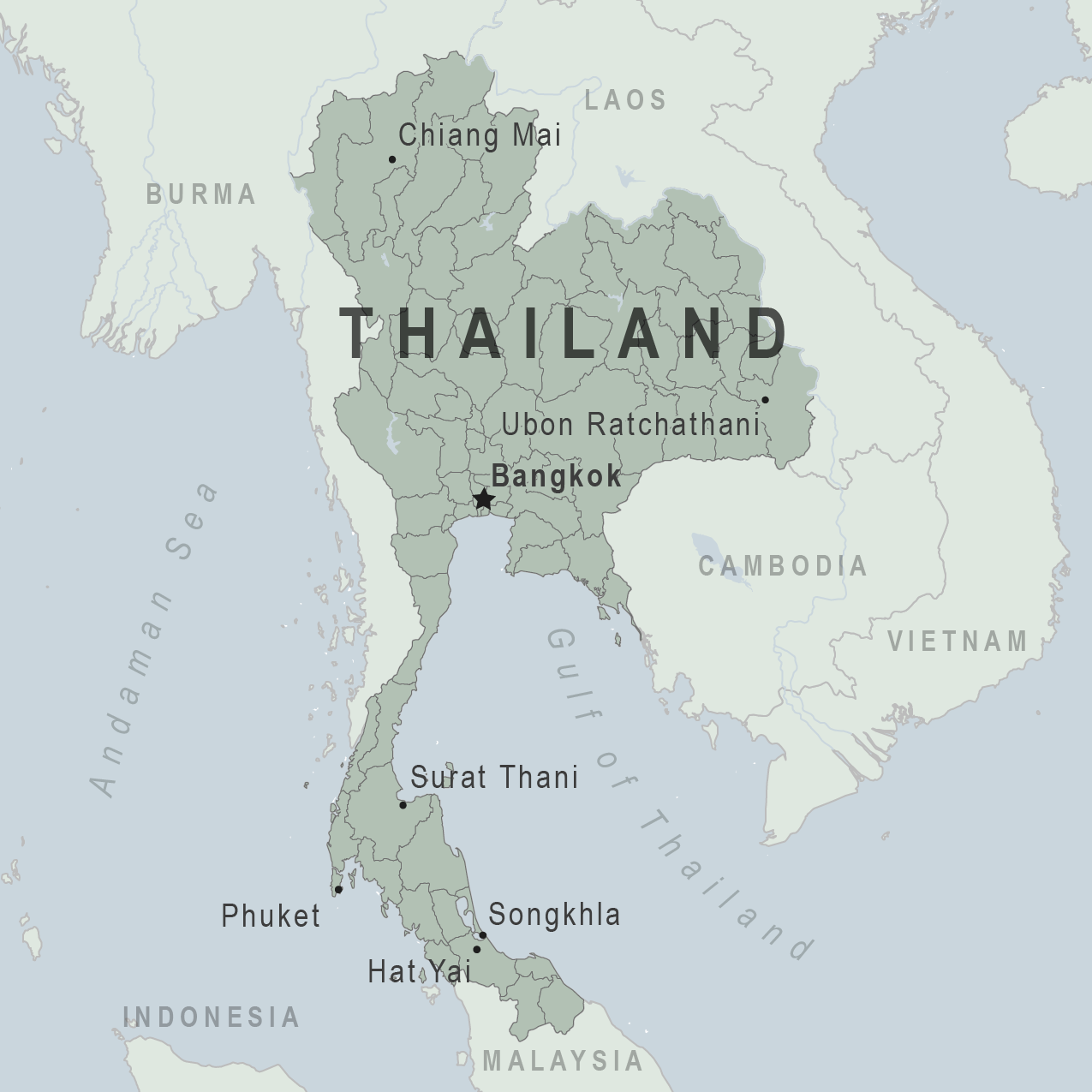
There are no notices currently in effect for Thailand.
⇧ Top
Check the vaccines and medicines list and visit your doctor at least a month before your trip to get vaccines or medicines you may need. If you or your doctor need help finding a location that provides certain vaccines or medicines, visit the Find a Clinic page.
Routine vaccines
Recommendations.
Make sure you are up-to-date on all routine vaccines before every trip. Some of these vaccines include
- Chickenpox (Varicella)
- Diphtheria-Tetanus-Pertussis
- Flu (influenza)
- Measles-Mumps-Rubella (MMR)
Immunization schedules
All eligible travelers should be up to date with their COVID-19 vaccines. Please see Your COVID-19 Vaccination for more information.
COVID-19 vaccine
There is no longer active cholera transmission and vaccine is not recommended.
Cholera - CDC Yellow Book
Hepatitis A
Recommended for unvaccinated travelers one year old or older going to Thailand.
Infants 6 to 11 months old should also be vaccinated against Hepatitis A. The dose does not count toward the routine 2-dose series.
Travelers allergic to a vaccine component or who are younger than 6 months should receive a single dose of immune globulin, which provides effective protection for up to 2 months depending on dosage given.
Unvaccinated travelers who are over 40 years old, immunocompromised, or have chronic medical conditions planning to depart to a risk area in less than 2 weeks should get the initial dose of vaccine and at the same appointment receive immune globulin.
Hepatitis A - CDC Yellow Book
Dosing info - Hep A
Hepatitis B
Recommended for unvaccinated travelers younger than 60 years old traveling to Thailand. Unvaccinated travelers 60 years and older may get vaccinated before traveling to Thailand.
Hepatitis B - CDC Yellow Book
Dosing info - Hep B
Japanese Encephalitis
Recommended for travelers who
- Are moving to an area with Japanese encephalitis to live
- Spend long periods of time, such as a month or more, in areas with Japanese encephalitis
- Frequently travel to areas with Japanese encephalitis
Consider vaccination for travelers
- Spending less than a month in areas with Japanese encephalitis but will be doing activities that increase risk of infection, such as visiting rural areas, hiking or camping, or staying in places without air conditioning, screens, or bed nets
- Going to areas with Japanese encephalitis who are uncertain of their activities or how long they will be there
Not recommended for travelers planning short-term travel to urban areas or travel to areas with no clear Japanese encephalitis season.
Japanese encephalitis - CDC Yellow Book
Japanese Encephalitis Vaccine for US Children
CDC recommends that travelers going to certain areas of Thailand take prescription medicine to prevent malaria. Depending on the medicine you take, you will need to start taking this medicine multiple days before your trip, as well as during and after your trip. Talk to your doctor about which malaria medication you should take.
Find country-specific information about malaria.
Malaria - CDC Yellow Book
Considerations when choosing a drug for malaria prophylaxis (CDC Yellow Book)
Malaria information for Thailand.
Cases of measles are on the rise worldwide. Travelers are at risk of measles if they have not been fully vaccinated at least two weeks prior to departure, or have not had measles in the past, and travel internationally to areas where measles is spreading.
All international travelers should be fully vaccinated against measles with the measles-mumps-rubella (MMR) vaccine, including an early dose for infants 6–11 months, according to CDC’s measles vaccination recommendations for international travel .
Measles (Rubeola) - CDC Yellow Book
Rabid dogs are commonly found in Thailand. However, if you are bitten or scratched by a dog or other mammal while in Thailand, rabies treatment is often available.
Consider rabies vaccination before your trip if your activities mean you will be around dogs or wildlife.
Travelers more likely to encounter rabid animals include
- Campers, adventure travelers, or cave explorers (spelunkers)
- Veterinarians, animal handlers, field biologists, or laboratory workers handling animal specimens
- Visitors to rural areas
Since children are more likely to be bitten or scratched by a dog or other animals, consider rabies vaccination for children traveling to Thailand.
Rabies - CDC Yellow Book
Recommended for most travelers, especially those staying with friends or relatives or visiting smaller cities or rural areas.
Typhoid - CDC Yellow Book
Dosing info - Typhoid
Yellow Fever
Required for travelers ≥9 months old arriving from countries with risk for YF virus transmission; this includes >12-hour airport transits or layovers in countries with risk for YF virus transmission. 1
Yellow Fever - CDC Yellow Book
Avoid contaminated water
Leptospirosis
How most people get sick (most common modes of transmission)
- Touching urine or other body fluids from an animal infected with leptospirosis
- Swimming or wading in urine-contaminated fresh water, or contact with urine-contaminated mud
- Drinking water or eating food contaminated with animal urine
- Avoid contaminated water and soil
Clinical Guidance
Avoid bug bites.
Chikungunya
- Mosquito bite
- Avoid Bug Bites
- Mosquito bite
Leishmaniasis
- Sand fly bite
- An infected pregnant woman can spread it to her unborn baby
Airborne & droplet
Avian/bird flu.
- Being around, touching, or working with infected poultry, such as visiting poultry farms or live-animal markets
- Avoid domestic and wild poultry
- Breathing in air or accidentally eating food contaminated with the urine, droppings, or saliva of infected rodents
- Bite from an infected rodent
- Less commonly, being around someone sick with hantavirus (only occurs with Andes virus)
- Avoid rodents and areas where they live
- Avoid sick people
Tuberculosis (TB)
- Breathe in TB bacteria that is in the air from an infected and contagious person coughing, speaking, or singing.
Learn actions you can take to stay healthy and safe on your trip. Vaccines cannot protect you from many diseases in Thailand, so your behaviors are important.
Eat and drink safely
Food and water standards around the world vary based on the destination. Standards may also differ within a country and risk may change depending on activity type (e.g., hiking versus business trip). You can learn more about safe food and drink choices when traveling by accessing the resources below.
- Choose Safe Food and Drinks When Traveling
- Water Treatment Options When Hiking, Camping or Traveling
- Global Water, Sanitation and Hygiene | Healthy Water
- Avoid Contaminated Water During Travel
You can also visit the Department of State Country Information Pages for additional information about food and water safety.
Prevent bug bites
Bugs (like mosquitoes, ticks, and fleas) can spread a number of diseases in Thailand. Many of these diseases cannot be prevented with a vaccine or medicine. You can reduce your risk by taking steps to prevent bug bites.
What can I do to prevent bug bites?
- Cover exposed skin by wearing long-sleeved shirts, long pants, and hats.
- Use an appropriate insect repellent (see below).
- Use permethrin-treated clothing and gear (such as boots, pants, socks, and tents). Do not use permethrin directly on skin.
- Stay and sleep in air-conditioned or screened rooms.
- Use a bed net if the area where you are sleeping is exposed to the outdoors.
What type of insect repellent should I use?
- FOR PROTECTION AGAINST TICKS AND MOSQUITOES: Use a repellent that contains 20% or more DEET for protection that lasts up to several hours.
- Picaridin (also known as KBR 3023, Bayrepel, and icaridin)
- Oil of lemon eucalyptus (OLE) or para-menthane-diol (PMD)
- 2-undecanone
- Always use insect repellent as directed.
What should I do if I am bitten by bugs?
- Avoid scratching bug bites, and apply hydrocortisone cream or calamine lotion to reduce the itching.
- Check your entire body for ticks after outdoor activity. Be sure to remove ticks properly.
What can I do to avoid bed bugs?
Although bed bugs do not carry disease, they are an annoyance. See our information page about avoiding bug bites for some easy tips to avoid them. For more information on bed bugs, see Bed Bugs .
For more detailed information on avoiding bug bites, see Avoid Bug Bites .
Some diseases in Thailand—such as dengue, Zika, and filariasis—are spread by bugs and cannot be prevented with a vaccine. Follow the insect avoidance measures described above to prevent these and other illnesses.
Stay safe outdoors
If your travel plans in Thailand include outdoor activities, take these steps to stay safe and healthy during your trip.
- Stay alert to changing weather conditions and adjust your plans if conditions become unsafe.
- Prepare for activities by wearing the right clothes and packing protective items, such as bug spray, sunscreen, and a basic first aid kit.
- Consider learning basic first aid and CPR before travel. Bring a travel health kit with items appropriate for your activities.
- If you are outside for many hours in heat, eat salty snacks and drink water to stay hydrated and replace salt lost through sweating.
- Protect yourself from UV radiation : use sunscreen with an SPF of at least 15, wear protective clothing, and seek shade during the hottest time of day (10 a.m.–4 p.m.).
- Be especially careful during summer months and at high elevation. Because sunlight reflects off snow, sand, and water, sun exposure may be increased during activities like skiing, swimming, and sailing.
- Very cold temperatures can be dangerous. Dress in layers and cover heads, hands, and feet properly if you are visiting a cold location.
Stay safe around water
- Swim only in designated swimming areas. Obey lifeguards and warning flags on beaches.
- Practice safe boating—follow all boating safety laws, do not drink alcohol if driving a boat, and always wear a life jacket.
- Do not dive into shallow water.
- Do not swim in freshwater in developing areas or where sanitation is poor.
- Avoid swallowing water when swimming. Untreated water can carry germs that make you sick.
- To prevent infections, wear shoes on beaches where there may be animal waste.
Leptospirosis, a bacterial infection that can be spread in fresh water, is found in Thailand. Avoid swimming in fresh, unchlorinated water, such as lakes, ponds, or rivers.
Keep away from animals
Most animals avoid people, but they may attack if they feel threatened, are protecting their young or territory, or if they are injured or ill. Animal bites and scratches can lead to serious diseases such as rabies.
Follow these tips to protect yourself:
- Do not touch or feed any animals you do not know.
- Do not allow animals to lick open wounds, and do not get animal saliva in your eyes or mouth.
- Avoid rodents and their urine and feces.
- Traveling pets should be supervised closely and not allowed to come in contact with local animals.
- If you wake in a room with a bat, seek medical care immediately. Bat bites may be hard to see.
All animals can pose a threat, but be extra careful around dogs, bats, monkeys, sea animals such as jellyfish, and snakes. If you are bitten or scratched by an animal, immediately:
- Wash the wound with soap and clean water.
- Go to a doctor right away.
- Tell your doctor about your injury when you get back to the United States.
Consider buying medical evacuation insurance. Rabies is a deadly disease that must be treated quickly, and treatment may not be available in some countries.
Reduce your exposure to germs
Follow these tips to avoid getting sick or spreading illness to others while traveling:
- Wash your hands often, especially before eating.
- If soap and water aren’t available, clean hands with hand sanitizer (containing at least 60% alcohol).
- Don’t touch your eyes, nose, or mouth. If you need to touch your face, make sure your hands are clean.
- Cover your mouth and nose with a tissue or your sleeve (not your hands) when coughing or sneezing.
- Try to avoid contact with people who are sick.
- If you are sick, stay home or in your hotel room, unless you need medical care.
Avoid sharing body fluids
Diseases can be spread through body fluids, such as saliva, blood, vomit, and semen.
Protect yourself:
- Use latex condoms correctly.
- Do not inject drugs.
- Limit alcohol consumption. People take more risks when intoxicated.
- Do not share needles or any devices that can break the skin. That includes needles for tattoos, piercings, and acupuncture.
- If you receive medical or dental care, make sure the equipment is disinfected or sanitized.
Know how to get medical care while traveling
Plan for how you will get health care during your trip, should the need arise:
- Carry a list of local doctors and hospitals at your destination.
- Review your health insurance plan to determine what medical services it would cover during your trip. Consider purchasing travel health and medical evacuation insurance.
- Carry a card that identifies, in the local language, your blood type, chronic conditions or serious allergies, and the generic names of any medications you take.
- Some prescription drugs may be illegal in other countries. Call Thailand’s embassy to verify that all of your prescription(s) are legal to bring with you.
- Bring all the medicines (including over-the-counter medicines) you think you might need during your trip, including extra in case of travel delays. Ask your doctor to help you get prescriptions filled early if you need to.
Many foreign hospitals and clinics are accredited by the Joint Commission International. A list of accredited facilities is available at their website ( www.jointcommissioninternational.org ).
In some countries, medicine (prescription and over-the-counter) may be substandard or counterfeit. Bring the medicines you will need from the United States to avoid having to buy them at your destination.
Malaria is a risk in some parts of Thailand. If you are going to a risk area, fill your malaria prescription before you leave, and take enough with you for the entire length of your trip. Follow your doctor’s instructions for taking the pills; some need to be started before you leave.
Select safe transportation
Motor vehicle crashes are the #1 killer of healthy US citizens in foreign countries.
In many places cars, buses, large trucks, rickshaws, bikes, people on foot, and even animals share the same lanes of traffic, increasing the risk for crashes.
Be smart when you are traveling on foot.
- Use sidewalks and marked crosswalks.
- Pay attention to the traffic around you, especially in crowded areas.
- Remember, people on foot do not always have the right of way in other countries.
Riding/Driving
Choose a safe vehicle.
- Choose official taxis or public transportation, such as trains and buses.
- Ride only in cars that have seatbelts.
- Avoid overcrowded, overloaded, top-heavy buses and minivans.
- Avoid riding on motorcycles or motorbikes, especially motorbike taxis. (Many crashes are caused by inexperienced motorbike drivers.)
- Choose newer vehicles—they may have more safety features, such as airbags, and be more reliable.
- Choose larger vehicles, which may provide more protection in crashes.
Think about the driver.
- Do not drive after drinking alcohol or ride with someone who has been drinking.
- Consider hiring a licensed, trained driver familiar with the area.
- Arrange payment before departing.
Follow basic safety tips.
- Wear a seatbelt at all times.
- Sit in the back seat of cars and taxis.
- When on motorbikes or bicycles, always wear a helmet. (Bring a helmet from home, if needed.)
- Avoid driving at night; street lighting in certain parts of Thailand may be poor.
- Do not use a cell phone or text while driving (illegal in many countries).
- Travel during daylight hours only, especially in rural areas.
- If you choose to drive a vehicle in Thailand, learn the local traffic laws and have the proper paperwork.
- Get any driving permits and insurance you may need. Get an International Driving Permit (IDP). Carry the IDP and a US-issued driver's license at all times.
- Check with your auto insurance policy's international coverage, and get more coverage if needed. Make sure you have liability insurance.
- Avoid using local, unscheduled aircraft.
- If possible, fly on larger planes (more than 30 seats); larger airplanes are more likely to have regular safety inspections.
- Try to schedule flights during daylight hours and in good weather.
Medical Evacuation Insurance
If you are seriously injured, emergency care may not be available or may not meet US standards. Trauma care centers are uncommon outside urban areas. Having medical evacuation insurance can be helpful for these reasons.
Helpful Resources
Road Safety Overseas (Information from the US Department of State): Includes tips on driving in other countries, International Driving Permits, auto insurance, and other resources.
The Association for International Road Travel has country-specific Road Travel Reports available for most countries for a minimal fee.
For information traffic safety and road conditions in Thailand, see Travel and Transportation on US Department of State's country-specific information for Thailand .
Traffic flows on the left side of the road in Thailand.
- Always pay close attention to the flow of traffic, especially when crossing the street.
- LOOK RIGHT for approaching traffic.
Maintain personal security
Use the same common sense traveling overseas that you would at home, and always stay alert and aware of your surroundings.
Before you leave
- Research your destination(s), including local laws, customs, and culture.
- Monitor travel advisories and alerts and read travel tips from the US Department of State.
- Enroll in the Smart Traveler Enrollment Program (STEP) .
- Leave a copy of your itinerary, contact information, credit cards, and passport with someone at home.
- Pack as light as possible, and leave at home any item you could not replace.
While at your destination(s)
- Carry contact information for the nearest US embassy or consulate .
- Carry a photocopy of your passport and entry stamp; leave the actual passport securely in your hotel.
- Follow all local laws and social customs.
- Do not wear expensive clothing or jewelry.
- Always keep hotel doors locked, and store valuables in secure areas.
- If possible, choose hotel rooms between the 2nd and 6th floors.
To call for emergency services while in Thailand, dial 1669 for an ambulance, 199 for the fire department, and 191 for the police. Write these numbers down to carry with you on your trip.
Learn as much as you can about Thailand before you travel there. A good place to start is the country-specific information on Thailand from the US Department of State.
Healthy Travel Packing List
Use the Healthy Travel Packing List for Thailand for a list of health-related items to consider packing for your trip. Talk to your doctor about which items are most important for you.
Why does CDC recommend packing these health-related items?
It’s best to be prepared to prevent and treat common illnesses and injuries. Some supplies and medicines may be difficult to find at your destination, may have different names, or may have different ingredients than what you normally use.
If you are not feeling well after your trip, you may need to see a doctor. If you need help finding a travel medicine specialist, see Find a Clinic . Be sure to tell your doctor about your travel, including where you went and what you did on your trip. Also tell your doctor if you were bitten or scratched by an animal while traveling.
If your doctor prescribed antimalarial medicine for your trip, keep taking the rest of your pills after you return home. If you stop taking your medicine too soon, you could still get sick.
Malaria is always a serious disease and may be a deadly illness. If you become ill with a fever either while traveling in a malaria-risk area or after you return home (for up to 1 year), you should seek immediate medical attention and should tell the doctor about your travel history.
For more information on what to do if you are sick after your trip, see Getting Sick after Travel .
Map Disclaimer - The boundaries and names shown and the designations used on maps do not imply the expression of any opinion whatsoever on the part of the Centers for Disease Control and Prevention concerning the legal status of any country, territory, city or area or of its authorities, or concerning the delimitation of its frontiers or boundaries. Approximate border lines for which there may not yet be full agreement are generally marked.
Other Destinations
If you need help finding travel information:
Message & data rates may apply. CDC Privacy Policy
File Formats Help:
- Adobe PDF file
- Microsoft PowerPoint file
- Microsoft Word file
- Microsoft Excel file
- Audio/Video file
- Apple Quicktime file
- RealPlayer file
- Zip Archive file
Exit Notification / Disclaimer Policy
- The Centers for Disease Control and Prevention (CDC) cannot attest to the accuracy of a non-federal website.
- Linking to a non-federal website does not constitute an endorsement by CDC or any of its employees of the sponsors or the information and products presented on the website.
- You will be subject to the destination website's privacy policy when you follow the link.
- CDC is not responsible for Section 508 compliance (accessibility) on other federal or private website.

Overtourism Be Damned: What Makes Airbnb's Travel Takeover Unstoppable
Updated May 2, 2024 at 2:30 p.m.*
PARIS — “Stop overtourism: Saint-Malo is not Disney Malo”
It was last July when this banner was hoisted high on the ramparts of the French coastal town, reminding summer visitors of the excesses of mass tourism, largely encouraged by the proliferation of Airbnb and other seasonal rentals.
✉️ You can receive our Bon Vivant selection of fresh reads on international culture, food & travel directly in your inbox. Subscribe here.
The introduction in 2021 of one of the most drastic regulations in France (quotas per neighborhood, only one property authorized per owner) has been challenged in the courts — and has not really changed the situation in a town of 47,000 regular inhabitants that can welcome 250,000 visitors on a typical sunny day.
While investors are a little less present in the previously lucrative short-term lodgment segment, real estate agents have not noticed any significant shift by owners towards longer-term rentals, which would enable local people to find accommodation all year round. According to the local authority, only 400 properties have changed to long-term since the new regulations arrived.
In scenic Saint-Malo , as in so many other towns hit by the housing crisis, Airbnb continues to be accused of a litany of ills. Some 250 of 4,000 municipalities in France where the site operates have introduced regulations of varying strictness (registration number, restrictive change of use for second homes, etc.).
This is also the case for 80% of the platform's markets worldwide.
Criticized in Paris, Biarritz and Marseille, but also in Amsterdam, Barcelona and Los Angeles, almost banned from its historic stronghold of New York (where since September it’s no longer been possible to rent an entire apartment for less than 30 days) criticized for its questionable legal arrangements that enable it to limit the tax it pays to certain states, and subject to a tax catch-up in Italy, the undisputed leader in short-term rental never ceases to be in the spotlight, and rarely for good reasons.
And yet the company’s results have never been as rosy as in this post-pandemic period of so-called "revenge tourism," with 2023 breaking global travel and vacation records. Booking.com had the best performance in its history. Airbnb, which made its first net annual profit in 2022, continued to ride the wave of strong demand. Its sales ($9.9 billion) have doubled since the 2018-2019 financial year. The latest results, published at the start of February, belie the impression of a company in trouble.
In the first quarter, business was further boosted by the frenzy of foreign travel and the increase in long-term bookings, particularly for stays of more than three months (+20%). Almost 99 million nights and "experiences" — cooking classes, unusual visits and other local activities offered in addition to accommodation — were booked, an increase of 12% over the previous year. In this respect, the quarter was the fourth best performance since the start-up was launched in 2008.
Brisk pace of innovation
With the boom in tourist and business travel and the proliferation of major conferences and sporting events — including this summer's Olympic Games in Paris — the planets seem to be aligned for the near future.
On Wednesday, Airbnb unveiled a series of changes at a major event in Los Angeles, designed to further stimulate growth. The company introduced Icons , a new category of "extraordinary experiences hosted by the greatest names in music, film, television, art, sports, and more" — like Disney's Up house, the Ferrari Museum in Italy, the home Prince purchased for his Purple Rain movie , or a room at Paris's Musée d'Orsay. Other new features were also rolled out, meant to facilitate the planning of group trips, as well as upgrades for hosts.
The contrast with the COVID period is striking.
“What's important is the pace of innovation over the last two or three years," explains Emmanuel Marill, CEO of Europe, the Middle East and Africa. "Now, every year, November and May are highlights for new products. This is unprecedented in the company's history.”
In any case, the contrast with the COVID period is striking, when Airbnb was forced to shed a quarter of its workforce in the face of a slump in business.
To explain the apparent paradox between the proliferation of regulatory obstacles and the reality of a flourishing business, CEO Brian Chesky explained to shareholders in November that the media generally focuses on markets that are important but not always financially significant. Before its strict Local Law 18 came into force, New York generated just 1% of the company’s business.
But the key to its success lies in its vast portfolio of 7.7 million “unique and different” properties, which means that Airbnb far outstrips its competitors.
Active in some 220 markets, the multinational business can compensate for a slump in one territory by expanding into others. With its traditional flats, but also its lighthouses, yurts , caves and containers, it is able to meet the needs of customers whoever they are, wherever they are and whatever they want. Some 1.5 billion travelers have experienced a piece of since the company was founded in 2007.
www.youtube.com
The revenge of advertising
Some campaigns are particularly glamorous, like the Malibu mansion transformed into a Barbie house , which caused more ink to flow in the international press than the IPO at the end of 2020! France also had its fair share of dream offers, with the possibility of sleeping in the Palais Opera House, Moulin Rouge or the Louvre Pyramid.
The range of accommodation on offer gives Airbnb unrivaled flexibility. While the pandemic led to a boom in rentals within 50 kilometers of home and a preference for remote, sparsely populated locations, “big cities are becoming trendy again,” says Nate Blecharczyk, one of the three co-founders and now Chief Strategy Officer of the company.
Two-thirds of areas in the countries where Airbnb operates have no hotel infrastructure.
A return to its roots: In 2008, Airbnb was originally launched under the name Airbed & Breakfast to offer an inflatable mattress and breakfast in San Francisco. For a long time, the platform was associated with big cities and major international destinations (80% of overnight stays booked before COVID). Today, offers are evenly split between cities (49% of bookings worldwide) and other areas.
Big city roots
The situation in the United States, which remains the biggest market ahead of France, is emblematic. Jamie Lane, chief economist at AirDNA, a website specializing in analyzing holiday rental data for investors, has calculated that the slow in demand seen between 2018 and 2021 in the now-regulated metropolises (Miami, Boston, Los Angeles, San Francisco, Denver, Washington, etc.) was partially offset by the progress made in rural areas (+24% in 2023), which are only too happy to welcome tourists to places that have been overlooked. According to official Census Bureau statistics, two-thirds of areas in the countries where Airbnb operates have no hotel infrastructure. In France, the platform operates in nearly 25,000 towns and cities, while only 7,500 have hotels.
Researchers at France’s national scientific research center (CNRS) and at Université Paris Cité have undertaken a survey of furnished tourist accommodation in Greater Paris, based on AirDNA figures. Their conclusion: In less than ten years, the explosion of the market in the Paris region has mainly benefited the inner and outer suburbs, most of which are unregulated. While in 2016 Paris accounted for 81% of Airbnb bookings, by 2022 only 54% of overnight stays would be in the inner city.
Other post-pandemic trends also favor Airbnb over hotels. On the American market, Jamie Lane has noticed a craze for spacious accommodation (three rooms or more), rented by larger groups, and often for periods well in excess of a week. Since COVID-19 demonstrated that it was possible to work remotely, the public is willing to combine business and leisure travel, extending a holiday with a professional stay: a so-called " workation ."
Hybrid travel
Airbnb employees are the embodiment of this. Since 2022, the company has made it possible to work from virtually anywhere in the world with no impact on salary. A Japanese employee, for example, can spend a month in Colombia. Nate Blecharczyk himself is making the most of this opportunity. With his casual polo shirt and tanned complexion, the 40-year-old is currently on a nine-month family trip that will take him to around 20 countries.
“I’ve already spent 110 nights in different Airbnbs and I’ve discovered some really exceptional places. I generally trust the new ‘Travelers’ favorites’ tab to book in the best-rated places,” he says, drawing our attention to his spectacular screen background: A luxurious tree-house in the depths of Indonesia , where he'd been staying
Functionalities have recently been added to better highlight offers that meet the needs of this type of customer. The “wifi” filter has become a key feature. Another filter isolates ads that are open for more than one month. Many accommodation providers offer reduced rates and discounts for long stays.
Staying reasonable for the Olympics
Retired for almost a year, Thérèse has been offering a duplex apartment for four people with its own entrance in her main residence in Gentilly, 50 meters from Paris. “Over and above the financial aspect, which is not insignificant, it's a way of maintaining social contact. I welcome people from all over the world to my home,” explains the owner.
She has welcomed Danish, Spanish, Korean, Japanese, American, Australian and Chinese guests among the more than 20 rentals since last March. To make them feel welcome, she has hunted out crockery, bought beautiful linen and invested in audio equipment. “I experienced Airbnb as a tenant and I want to offer the same level of service that I would have liked.”
Thérèse only offers her accommodation when she is available to welcome tourists, below the 120 days authorized per year. Aware of the unpopularity of cleaning charges, she has got rid of them, like many owners, and is content in just asking for the premises to be left clean. Despite two disappointments and the chores involved in renting (“I’ve never cleaned so much in my life”), she is satisfied with her experience.
To determine her rates as accurately as possible, she scans the advertisements of other hosts in the area and the Ibis and Novotel hotels at Porte d'Orléans. “Even for the Olympics , I want to keep the price reasonable. I’ll be getting between 150 and 190 euros per night, excluding commission. At that price, the three weeks were booked in a few days.”
While France is one of the handful of mature markets on Airbnb (with the U.S., Canada and Australia), other destinations are growing much faster. In Brazil, the market has almost doubled in four years. Since the end of the pandemic, Germany has become one of the three largest European markets, after France and the UK.
There are now thousands of rentals available in cities in Ghana, Liberia and Sierra Leone.
In Taiwan, Thailand and Indonesia, overnight stays increased by 30% last year. Korea is also booming. “And you can’t even imagine the network I take care of in Africa,” says Emmanuel Marill. “There are now thousands of rentals available in cities in Ghana, Liberia and Sierra Leone.”
In the future, will Airbnb be more than a simple accommodation site?
After COVID , management focused mainly on improving the basic offering. Now that the results are in, isn't it time to consider diversification? In 2016, CEO Chesky had envisaged bringing together all aspects of travel in an “all-in-one” app including plane tickets, car hire, restaurant reservations. The project never materialized, but with advances in AI, it is more feasible now than ever.
The multinational, however, has no intention of jumping the gun. “We’ve got a certain humility,” says Blecharczyk. “Before launching anything, we want to identify the activities in which we can really make a difference.” Despite the critics, the 16-year-old unicorn still has its life ahead of it.
*Originally published April 20, 2023, this article was updated May 2, 2024 with updates on announcements made in Los Angeles on May 1, and enriched media.
Like our content? Follow us for more. This article first appeared on Worldcrunch.com It was translated and adapted by Worldcrunch in partnership with LES ECHOS . For the latest news & views from every corner of the world, Worldcrunch Today is the only truly international newsletter. Sign up here .

- International edition
- Australia edition
- Europe edition
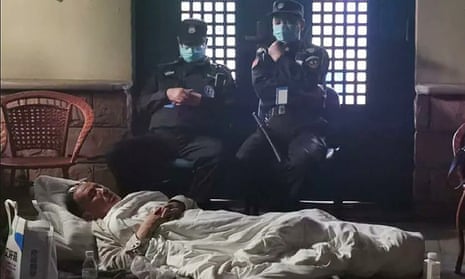
First scientist to publish Covid sequence in China protests over lab ‘eviction’
Zhang Yongzhen stages sit-in protest, as government attempts to avoid scrutiny over handling of outbreak
The first Chinese scientist to publish a genomic sequence of the Covid-19 virus, in defiance of government orders, staged a sit-in protest after claiming he was locked out of his laboratory over the weekend.
Zhang Yongzhen, a virologist, said in an online post on Monday that he and his team had been given a sudden eviction notice from their lab, and guards had barred him from entering it over the weekend. The post, published on Weibo, was later deleted, Associated Press (AP) reported.
After extensive media and social media coverage, on Wednesday Zhang said he and his team had been “tentatively” allowed to resume work inside the lab.
“I would like to sincerely thank all the netizens and people from all walks of life who have supported me and my team for a long time,” he said on Weibo.
Zhang had been sitting outside the lab since Sunday. Photos posted online show a man purported to be Zhang sleeping on the ground.
The dispute between Shanghai Public Health Clinical Center and Dr. Zhang Yongzhen's team continues. Dr. Zhang allegedly shared photos of himself sleeping on the floor at the entrance of the laboratory. https://t.co/K5ztBAv6yE pic.twitter.com/6wBkkLLQnB — Yanzhong Huang (@YanzhongHuang) April 29, 2024
Zhang published his scientific findings about Covid-19 without government approval in January 2020. He and his team have since been subject to a series of setbacks, demotions and oustings, of which the eviction appears to be the latest.
The Shanghai Public Health Clinical Center said in a statement that Zhang’s lab was closed for “safety reasons” and renovations. It said Zhang’s team had been given alternative lab space.
However, Zhang said the offer was not made until after his team was evicted, and that the new lab did not meet the team’s required safety standards.
“I won’t leave, I won’t quit, I am pursuing science and the truth!” he said in the since-deleted Weibo post. “The Public Health Center are refusing to let me and my students go inside the laboratory office to take shelter.”
Teacher Li, who runs an information-sharing and activism-monitoring account on X, said students had protested against the closure and clashed with security guards.
Zhang, when reached by phone on Tuesday, said it was “inconvenient” for him to speak, but a colleague confirmed to AP on Monday the protest was taking place.
The move shows how the Chinese government continues to pressure and control scientists, seeking to avoid scrutiny of its handling of the coronavirus outbreak .
After sequencing the virus on 5 January 2020, Zhang and his team initially sent a notice to Chinese authorities warning of its potential to spread. The next day his lab was temporarily shut down by China’s top health official.
Foreign scientists called for Zhang and other Chinese scientists to be allowed to publish the sequencing. The following week Zhang published his sequence – without authority – allowing global health authorities to begin testing for Covid-19, finding that it was spreading outside China. It also kickstarted the development of tests, vaccinations and other pandemic measures.
Internationally Zhang was lauded, receiving prizes in recognition of his work, but domestically he came under pressure. He was barred from collaborating with some former research partners and removed from his post at the Chinese Center for Disease Control and Prevention.
During the pandemic, the government also arrested citizen journalists who sought to report on the impact of the outbreak on people and hospitals.
In 2021 Zhang told the New York Times he did not regret his actions. “I trusted myself. I have so much experience, my team has made so many discoveries over the years, that we were able to make accurate judgments,” he said.
Zhang’s team appeared to receive a lot of public support on Weibo, where related hashtags were viewed by tens of millions of Chinese. “How can the country develop if we treat scientific researchers like this?” one said.
Some article links appeared to have been removed since they were posted but extensive discussion of Zhang’s dispute with the Shanghai health authority remained online on Tuesday afternoon.
- Coronavirus
- Infectious diseases
- Asia Pacific
- Medical research
- Microbiology
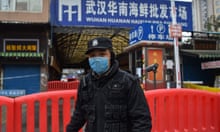
Newly released Chinese Covid data points to infected animals in Wuhan

Doctor who exposed China’s cover-up of Sars crisis dies aged 91
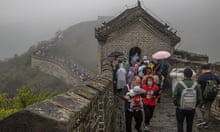
China to reopen to foreign tourists for first time since Covid crisis

Detained activist fears for missing zero-Covid protesters in China

China claims ‘decisive victory’ over Covid amid doubt over figures
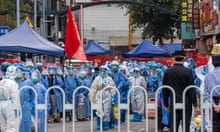
China’s provinces spent almost £43bn on Covid measures in 2022

Eight in 10 people in China caught Covid since early December, say officials
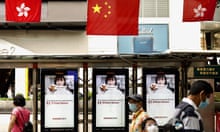
Chinese flock to Hong Kong to get private Covid booster shots

Chinese warned not to visit elderly relatives as Covid spreads from cities
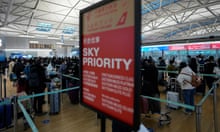
China halts short-term visas for South Korea and Japan over Covid travel curbs
Most viewed.
Home Toggle navigation FR Toggle Search Search the site Search About us About us Head office Regional offices History Archives Background materials Photos and videos Accessibility Contact us Corporate governance Board of Directors Governing Council and Senior Management Governance documents Educational resources The Economy, Plain and Simple Explainers Financial education resources Careers Take a central role at the Bank of Canada with our current opportunities and scholarships.
Benchmarks for assessing labour market health: 2024 update
This staff analytical note builds on Ens et al. (2021); Ens et al. (2022); and Ens, See and Luu (2023) to assess the health of the Canadian labour market. These earlier works established a more granular framework for assessing the labour market given its diverse and segmented nature. In this note we do three things:
- We update the range of benchmarks in our dashboard of indicators, to ensure they remain relevant. We add an additional year of data, adjust for population aging and improve our filter estimates. We also estimate a series of Phillips curve equations using each indicator of the dashboard to understand how much inflationary pressure is coming from the labour market.
- We do a deep dive to better understand structural changes in the Canadian labour market that could cloud assessments of labour slack. This includes a closer look at the muted recoveries in self-employment and low-wage jobs.
- And finally, we discuss whether the labour market has moved into balance and how much it is contributing to inflation.
We find that the labour market has likely entered into balance from overheated levels, and we also see some signs of structural changes:
- Overall, the labour market appears to have moved into balance. Notably, we see a large reduction in job openings and other demand indicators but no significant rise in layoffs. Moreover, Phillips curve estimates suggest that the labour market was not a large source of inflationary pressure in the first quarter of 2024.
- Self-employment and low-wage employment appear to be permanently lower than in the past. For low-wage workers, this reflects lower levels of demand coming out of the COVID-19 pandemic, though impacted workers were largely able to reallocate to other sectors given the tight labour market following the reopening of the economy. Workers who are self-employed due to weak job prospects also make up a smaller share of the labour market than in the past, and this appears to be a long-term trend. As a result, weakness in indicators of self-employment and low-wage employment in the dashboard is less likely to represent labour market slack.
Updates to the benchmark ranges
To construct the benchmark ranges, we use estimates that each convey valuable information on the state of the labour market. Each range includes the Hodrick-Prescott (HP) filter (Hodrick and Prescott 1997), a modified Hamilton filter (Hamilton 2018; Quast and Wolters 2022), the most recent period the labour input gap was closed (Ens et al. 2022) and model-based estimates used by Bank of Canada staff for potential output (Devakos et al. 2024). We bound these ranges by the historical minimum and maximum since 2003. In this section, we outline two key updates for 2024.
Vacancy measures
Before presenting the new benchmark ranges, we first re-evaluate two measures related to job vacancies that are included in measures of overall labour market conditions. These are the vacancy–unemployment ratio (tightness) and the ratio of vacant jobs to the sum of vacant and filled jobs (vacancy rate).
Relative to other indicators in the dashboard, both measures suffer from short samples, with the earliest published data on vacancies beginning only in April 2015. At the start of the sample until before the pandemic, both measures were increasing. This was likely a continuation of the recovery from the 2008–09 global financial crisis. After a short but steep decline during the pandemic, both measures once again rose sharply during the economic recovery.
Together with the short sample, the dynamics of vacancies during both recoveries have resulted in a particularly strong trend estimate from the HP filter—implying extremely wide benchmark ranges (where the HP filter constitutes the upper bound). This can be seen in the wide ranges (in green) for both measures in Chart 1 . While market tightness may indeed have been on a long-run upward trend, the short sample makes HP filter estimates difficult to take at face value at this juncture. As a result, we temporarily exclude this filter for the benchmark ranges of the vacancy measures.
Chart 1: Benchmark ranges have been updated to reflect new data and re-evaluations of vacancy measures
A modern browser with javascript enabled is required to view our charts.
Alternatively, the data is available for download in:
Additional year of data
We incorporate data released since the last update of benchmarks in the first quarter of 2023. The filters and trend estimates have started to pick up some of the softening of the labour market over 2023, resulting in a slight leftward shift of the range of benchmarks. Chart 1 compares the new 2024 benchmarks (in blue) with their equivalent benchmarks using data as of the last reassessment in Ens, See and Luu (2023) (in green) for the indicators that pertain to overall labour market conditions. Chart A-1 and Chart A-2 in the Appendix display the new benchmarks for indicators that fall under the categories of job characteristics and labour market inclusiveness, respectively.
Are structural changes in the Canadian labour market clouding the assessment of slack?
Self-employment in a structural decline.
One indicator that has deviated in the dashboard is self-employment. It has been consistently below its benchmark range even when most other indicators have shown signs of excess demand. While self-employment is often linked to entrepreneurship, innovation and employment creation, it is sometimes an alternative to wage employment when job opportunities are scarce (Poschke 2023).
To understand what the drop in self-employment implies about the balance of the labour market, we show the evolution of self-employment according to Statistic Canada’s Labour Force Survey (see Chart 2 ). The blue line depicts a fall in the total number of self-employed workers as a percentage of employed workers over the past decade and a half. During the post-pandemic economic recovery, the downward trend has become more pronounced, following a brief peak of self-employment and an initial surge in unemployment at the onset of the pandemic.
Chart 2 also shows an important distinction between two types of self-employed workers: those who are entrepreneurs (incorporated), who are more educated and who are more likely to have employees (yellow line) versus those who are not entrepreneurs (unincorporated), who tend to have less education and who are less likely to have employees (green line) (Levine and Rubinstein 2017). 1 We refer to the latter as the marginal self-employed.
We can see that both the recent and the long-run drop in self-employment seem driven by the marginal self-employed workers. These are workers who tend to be on the fence between self-employment and other types of employment. Similarly, these marginal self-employed workers seem to explain most of the peak at the onset of the pandemic, as workers may have used self-employment to cope with a loss of other types of employment. The structural decline in self-employment, therefore, may represent a long-term trend of better employment prospects for marginal workers and a compositional shift toward incorporated self-employment.
Chart 2: Structural decline in self-employment has been driven by marginal self-employed workers
Chart 3 drills down to the occupation level. The drop in self-employment seems rather broad-based. For example, it is present in both managerial and non-managerial occupations (panel a), and, since the start of the recovery post-pandemic, in low wage occupations as well (panel b).
Chart 3: The decline in marginal self-employment is broad-based
Self-employed workers, as a percentage of employed workers
Sources: Statistics Canada and Bank of Canada calculations Last observation: February 2024
The structural decline in self-employment is paired with the observation that total employment did not fall at the same time: Chart A-3 in the Appendix shows that the employment rate has been rather stable in the past one and a half decades. This suggests that self-employed workers are likely reallocating to other forms of employment. Hence, the drop in self-employment observed in the dashboard does not mean there is more slack but instead points to a change in composition of employment away from self-employment. The acceleration of this trend in recent years explains why the current observation is outside the benchmark range. The filtering process to obtain this range takes time to incorporate structural changes.
Low-wage occupations have not recovered after the economic shock of COVID-19
Another indicator that has deviated from the rest of the dashboard is employment in low-wage occupations. 2 For most of the post-pandemic recovery, the employment rate in low-wage occupations has consistently been at the bottom of its benchmark range. This is in contrast to the path of employment in other occupations (as seen in Chart A-2 , panel c, in the Appendix).
To understand what this observation conveys about labour market slack, we use Chart 4 to plot the percent change in employment in low-wage and other occupations relative to the same month in 2019. The blue line shows that overall employment has risen roughly 10% above its 2019 level because of increased population growth and tight labour markets. However, the aggregate measure masks a pattern of reallocation induced by the pandemic—during which low-wage occupations were hit the hardest.
After the significant decline in employment during the COVID-19 recession, employment in low-wage occupations recovered partially but has since remained below pre-pandemic levels. In contrast, employment in other occupations has outpaced average employment growth. This suggests that excess tightness in the labour market during the post-pandemic economic recovery may have enabled workers in low-wage occupations to reallocate to other occupations.
Chart 4: Employment in low-wage occupations is still below pre-pandemic levels
To understand whether the decline in employment in low-wage occupations reflects reallocation of workers to other occupations, we observe the vacancies posted and unemployment rates for both occupation groups. Chart 5 shows that the share of vacancies posted for jobs categorized as low-wage occupations has declined slightly since the beginning of the economic recovery in 2021, in line with lower employment counts in these occupations. This rules out that the change in employment composition has led to excess demand or an outsized increase in unfilled vacancies in these occupations.
Chart 6 shows that the unemployment rates in both occupation groups (low-wage and others) have evolved in a similar fashion, despite the disparities in their employment rate paths. The data suggest that firms have shifted demand away from these occupations at the same time that workers have reallocated to other occupations, such that firm vacancy posting and worker job search behaviour balance out. 3
Overall, the weakness in low-wage employment relative to other labour dashboard indicators does not constitute strong evidence of current slack in the labour market. Instead, it is a symptom of structural changes in the occupational distribution that may have been accelerated or induced by the pandemic. As more data arrive, the filters embedded in the benchmarks should eventually account for this.
Chart 5: The share of vacancies in low-wage occupations has declined slightly
Chart 6: unemployment rates in both occupation groups have evolved in a similar fashion, is the labour market adding to inflation pressures, excess demand has eased.
To help determine whether the labour market is adding to inflationary pressures, we first look for any remaining excess demand in the labour market following the post-pandemic economic recovery (see analysis in Ens, See and Luu 2023). As part of this exercise, we narrow down the list of dashboard indicators to those that most closely resemble pure demand measures ( Chart 7 ). These include measures of unfilled job openings and labour shortages. We also include the involuntary part-time rate, which is a signal that people want to work more hours but there is insufficient demand. Finally, we include the job separation rate, at which employed workers become unemployed. This rate is often associated with involuntary layoffs.
Chart 7: Labour demand indicators have eased
Chart 7 shows that all these indicators have eased to varying degrees, which can be seen in the difference between their recent peaks (in green) and their current levels (in yellow). The declines are most pronounced in job vacancies and survey assessments of shortages. These measures are now all within or below their benchmark ranges. In contrast, the job separation rate eased much more modestly and is sitting just above its benchmark range. The overall picture—one of easing job openings but muted layoffs—is consistent with a gradual rebalancing of labour market conditions.
Wage pressures have moderated, suggesting a balanced labour market
As the “price” of labour, wage measures are one way to assess the balance between supply and demand. While wage measures have lagged behind the easing in other labour market measures over 2023, more recently they have been showing signs of moderation. Differences exist across measures, but for the most part they are now signalling wage growth below 4%. Moreover, around 1 percentage point (pp) of the current strength in wages may reflect past high inflation rather than labour market strength (Bounajm et al. forthcoming). With the marked slowdown in inflation since early 2023, wage measures should see further easing.
Chart 8: Measures of wages have been showing signs of moderation
One indicator that stands out among wage measures is unit labour costs (ULCs). ULCs can be important for inflation as they directly represent the costs that firms face when producing. ULCs are influenced by both productivity—the amount of output produced per unit of labour—and wage growth. Given the easing in wages, ULCs should see some relief. However, weak or negative productivity growth could keep these costs elevated, creating a risk of a more persistent source of pressure on wages.
Labour strength is consistent with its level before the pandemic and close to fundamentals
Despite the fact that excess demand appears to have eased, some uncertainty remains as to whether residual strength in the labour market is still adding to inflationary pressures. One way to assess this is to compare where indicators stand relative to their benchmark ranges in aggregate and over time.
Chart 9 plots the average of the labour market indicator gaps relative to their benchmark midpoint values. In 2022, coming out of the economic shock of the pandemic, the gap was on average more than one standard deviation above its benchmark values. This is considerably above all other time periods during the last 20 years. The easing in labour market conditions since early 2023 is also evident in the data, with the most recent value coming close to pre-pandemic values and in the vicinity of zero. Overall, this picture is consistent with a labour market that has eased but still has some strength.
Chart 9: Labour market conditions have eased
Phillips curve estimates suggest a modest contribution to inflation pressures.
To understand whether the remaining strength in the labour market is still generating inflationary pressures, it is important to tease out the impact of different labour market variables, as this is not uniform. One way to do this is by estimating a series of Phillips curve equations using each indicator of the dashboard as the explanatory variable. 4 We sort the coefficients of the dashboard indicators on the Phillips curve estimates according to their magnitude (and statistical significance) to learn which factors are more likely to impact inflation.
The results, summarized in Table 1 , hint at a clear hierarchy in the strength of the association between different types of indicators and inflation. The strongest link corresponds to unemployment rates, job changing rates and job finding rates. Wages are in the middle of the table with a smaller but significant contribution, in line with the premise that wage growth translates into inflation. Among the variables with the weakest association are participation rates.
Table 1: Some indicators contribute more to inflationary pressures than others
Note: For significance of estimates, a check mark denotes the 5% level, an exclamation mark denotes the 10% level, and a X denotes not statistically significant. For model fit, a full star means an R 2 above 0.28, half a star means it is between 0.17 and 0.28, and an empty star means it is below 0.17. SEPH is the Survey of Employment, Payrolls and Hours. BOS is the Business Outlook Survey. LFS is the Labour Force Survey. NAC is the National Income and Expenditure Accounts. Sources: Statistics Canada, Bank of Canada Business Outlook Survey and calculations.
The relative softness in the indicators that seem to fuel inflation the most (namely, job changing and job finding rates), together with the signs of slack coming from rising unemployment and involuntary part-time rates, indicate a labour market that is not likely exerting inflationary pressures. A similar message can be drawn from looking at multiple measures of wage growth that now sit below or near their benchmark ranges. Also, the estimated impacts of wages do not seem high at present, and most of the signals of labour market indicators are aligned with the aggregate output gap.
Finally, the indicators that most strongly convey remaining strength (e.g., participation and employment rates) seem quite dissociated from inflation according to our Phillips curve estimates. This result is somewhat intuitive given that the indicators partly reflect the available supply of workers.
As a summary measure of these associations, Chart 10 shows the overall contribution of labour market indicators. We sum the indicators’ deviation from the benchmark range midpoint, weighting each of them by their coefficients on the Phillips curve. 5 We see that the average contribution has substantially dropped—from a peak of 0.5 pps by mid-2023 to 0.3 pps by the first quarter in 2024.
Chart 10: The contribution of the labour market to above-target inflation was moderate
Chart a-1: measures of job characteristics.
Chart A-2: Measures of labour market inclusiveness
Note: This chart presents the current value of labour market indicators when compared with their historical worst and historical best. Benchmarks are composed of the modified Hamilton filter, the Hodrick-Prescott filter, the corresponding value of the indicator during a period when the labour input gap was closed and, for selected indicators, trend estimates produced by the Bank of Canada. Employment levels by wage are not seasonally adjusted. Sources: Statistics Canada and Bank of Canada calculations Last observation: February 2024
Chart A-3: Employment rate has been roughly stable in the last two decades
Bounajm, F., J. G. Junior Roc and Y. Zhang. Forthcoming. “Sources of Pandemic-Era Inflation in Canada: An Application of Bernanke and Blanchard.” Bank of Canada Staff Analytical Note.
Devakos, T., C. Hajzler, S. Houle, C. Johnston, A. Poulin-Moore, R. Rautu and T. Taskin. “ Potential Output in Canada: 2024 Assessment .” Bank of Canada Staff Analytical Note No. 2024-11.
Ens, E., L. Savoie-Chabot, K. See and S. L. Wee. 2021. “ Assessing Labour Market Slack for Monetary Policy .” Bank of Canada Staff Discussion Paper No. 2021-15.
Ens, E., C. Luu, K. See and S. L. Wee. 2022. “ Benchmarks for Assessing Labour Market Health .” Bank of Canada Staff Analytical Note No. 2022-2.
Ens, E., K. See and C. Luu. 2023. “ Benchmarks for Assessing Labour Market Health: 2023 Update .” Bank of Canada Staff Analytical Note No. 2023-7.
Hamilton, J. D. 2018. “Why You Should Never Use the Hodrick-Prescott Filter.” The Review of Economics and Statistics 100 (5): 831–843.
Hodrick, R. J. and E. C. Prescott. 1997. “Postwar US Business Cycles: An Empirical Investigation.” Journal of Money, Credit and Banking 29 (1): 1–16.
Levine, R. and Y. Rubinstein. 2017. “Smart and Illicit: Who Becomes an Entrepreneur and Do They Earn More?” The Quarterly Journal of Economics 132 (2): 963–1018.
Poschke, M. 2023. “Wage Employment, Unemployment and Self-Employment across Countries.” IZA Discussion Paper No. 16271.
Quast, J. and M. H. Wolters. 2022. “Reliable Real-Time Output Gap Estimates Based on a Modified Hamilton Filter.” Journal of Business & Economic Statistics 40 (1): 152–168.
- 1. Self-employed can be solo workers (freelancers, gig workers, etc.) or business owners. In the case of business owners, they may or may not hire employees, depending on the scale of their operations.[ ← ]
- 2. Low-wage occupations are those whose median wage in 2019 was less than $16.03 per hour (two-thirds of the 2019 annual median wage of $24.04 per hour). Occupations are based on two-digit National Occupational Classifications. Other occupations are the rest of the occupations not considered low wage.[ ← ]
- 3. The incomplete recovery in employment is also reflected in the lower output share in the accommodation and food services industry, which is more likely to employ workers in low-wage jobs. See Statistics Canada Table 36-10-0434-01, " Gross domestic product (GDP) at basic prices, by industry, monthly (x 1,000,000) " (2024).[ ← ]
- 4. The dependent variable is the deviation of quarterly annualized growth in the CPI-trim from the 2% target, and we include four lags of each dashboard indicator at a time as the explanatory variable. We include commodity prices and CAD/USD exchange rate changes (four-quarter moving averages) as controls. Explanatory variables are in deviations from the mid-point of their benchmark ranges. We calculate the total impact on inflation of each explanatory variable as the sum of coefficients on all lags, multiplied by its deviations. The equations are estimated over a sample from the first quarter of 1997 to the fourth quarter of 2019.[ ← ]
- 5. Indicators negatively associated with inflation receive a zero weight, as their contribution falls outside the range of meaningful relationships.[ ← ]
Acknowledgements
We thank Mikael Khan, Marc-André Gosselin and Alexander Ueberfeldt for helpful comments on earlier drafts of this paper. We also thank Colette Stoeber and Maren Hansen for their editorial suggestions and Andrée Charbonneau and Marie-Lou Lachance for translating. Finally, we would also like to thank Anna Shatalova and Ethan McTavish for their capable research assistance. Any errors are solely the responsibility of the authors.
Bank of Canada staff analytical notes are short articles that focus on topical issues relevant to the current economic and financial context, produced independently from the Bank’s Governing Council. This work may support or challenge prevailing policy orthodoxy. Therefore, the views expressed in this note are solely those of the authors and may differ from official Bank of Canada views. No responsibility for them should be attributed to the Bank.
DOI: https://doi.org/10.34989/san-2024-8
On this page Table of contents
We use cookies to help us keep improving this website.

IMAGES
VIDEO
COMMENTS
The Thai government has restored the mandatory quarantine of 10 days for unvaccinated Thai and foreign travelers. Thailand Pass is required for Thai and foreigners to enter Thailand including those nationalities under the Visa Exemption and Visa on Arrival list. The Test and Go Hotel, AQ Hotel, SHA+ Hotel reservation, and COVID-19 Insurance ...
From 1 May 2022, travelers entering Thailand by air will be subject to new entry measures, as follows; 1. Fully Vaccinated Persons must : - Register on Thailand Pass. - Attach required documents including passport, certificate of vaccination. - Attach proof of insurance with at least 10,000 USD coverage for medical treatments in Thailand (for ...
Thailand is resuming its Test-and-Go tourism plan from February, which means that fully vaccinated visitors can bypass seven-day quarantine and travel to any part of Thailand, provided they take a negative COVID-19 test on the first and fifth day of their visit.. Fully vaccinated tourists from 63 countries, including United States, the United Kingdom, Australia, Canada, Ireland, Germany, China ...
The basics. Thailand has recorded more than 32,000 deaths and over 4.67 million cases of Covid-19 as of September 26, 2022. Ad Feedback. On average, around 700 Covid-19 cases are reported per day ...
Thailand will ease some entry requirements for foreign visitors as it balances a rising number of coronavirus cases with the need to rebuild its pandemic-damaged economy, the government announced Wednesday, February 23. Beginning March 1, 2022, fully vaccinated visitors must take an RT-PCR test on arrival and spend their first night at an ...
Traveling to Thailand during Covid-19: What you need to know before you go ... most are waiting for higher demand starting January 2022. The government's predicting 300,000 incoming travelers ...
For travel to the United States on a temporary basis, including tourism, temporary employment, study and exchange. ... 2022 onwards, travelers entering Thailand will no longer be required to present COVID-19 related documents such as the certificate of vaccination and COVID-19 test result upon arrival in Thailand. Is a negative COVID-19 test ...
Yes, under the new regulations, visitors will need to first apply online for a Thailand Pass, uploading copies of their passport, vaccination certificate, flight confirmation, a Covid-19 health ...
Thailand entry details and exceptions. Effective January 9 to January 31, 2023 - Travelers (aged 18 years old and above) arriving in Thailand must have proof of vaccination; or proof of recovery from COVID in the last 6 months; or you may also provide a vaccine-exemption letter from a doctor stating you cannot receive a COVID vaccine due to ...
0:00. 2:36. BANGKOK — Visitors vaccinated for COVID-19 will no longer need a test before traveling to Thailand starting April 1, health officials said Friday. Visitors will still need to take a ...
Alternatively, unvaccinated travelers may skip quarantine and travel freely throughout Thailand if they arrive in the country with a negative COVID-19 PCR test taken within 72 hours of their trip.
Call us in Washington, D.C. at 1-888-407-4747 (toll-free in the United States and Canada) or 1-202-501-4444 (from all other countries) from 8:00 a.m. to 8:00 p.m., Eastern Standard Time, Monday through Friday (except U.S. federal holidays). See the State Department's travel website for the Worldwide Caution and Travel Advisories.
International travellers, including returning Thais and foreign residents, who are above 18 years of age should get fully vaccinated for Covid-19 with a vaccine approved by Thailand's Ministry of Public Health (MoPH) or the World Health Organisation (WHO) no less than 14 days before their travel date. Travellers 12-17 years of age, travelling ...
If you test positive for Covid-19 from using a rapid antigen test, or ATK, you must take an RT-PCR test to confirm if you have the virus. The Thai government only accepts positive RT-PCR tests as evidence of Covid-19 infection. Anyone who tests positive for Covid-19 is required by Thailand's emergency regulations to alert public health officials.
As of October 1, 2022, international travelers to Thailand no longer need to show proof of Covid vaccination or a negative Covid test. Plus, new mechanisms allow for longer stays in the Land of ...
Announced June 17, 2022 and effective July 1, Thailand is removing almost all of its Covid border measures. That includes the previous requirement for foreign visitors to have $10,000 US in travel ...
Visa requirements. British passport holders arriving by air or land can enter Thailand for 30 days without a visa (visa exemption). If you intend to stay longer (for work, study or other reasons ...
If you decide to travel to Thailand: Enroll in the Smart Traveler Enrollment Program (STEP) to receive Alerts and make it easier to locate you in an emergency. Follow the Department of State on Facebook and Twitter. Review the Country Security Report for Thailand. Have evacuation plans that do not rely on U.S. government assistance. Visit the ...
COVID-19: All eligible travelers should be up to date with their COVID-19 vaccines. Please see Your COVID-19 Vaccination for more information. COVID-19 vaccine. ... For information traffic safety and road conditions in Thailand, see Travel and Transportation on US Department of State's country-specific information for Thailand.
Update on COVID-19 in Thailand: 02 May 2024. Since March 2024, data reported by the Ministry of Public Health on a weekly basis indicates that hospital admissions due to COVID-19 have been increasing. More recently, the increase has been more significant - with the latest information showing 1672 new admissions and 9 deaths in the week prior ...
Airbnb, which made its first net annual profit in 2022, continued to ride the wave of strong demand. Its sales ($9.9 billion) have doubled since the 2018-2019 financial year.
The brief, Commuting in the United States: 2022, explores recent commuting trends using estimates from the 2022 ACS, 1-year dataset, with comparisons to 2019 and 2021. The analysis shows changes in the way people travel to work since the onset of the COVID-19 pandemic along with several key commuting characteristics, including means of ...
China's provinces spent almost £43bn on Covid measures in 2022. 15 Feb 2023. ... China halts short-term visas for South Korea and Japan over Covid travel curbs. 10 Jan 2023. Most viewed. Most ...
Most of the interviewees crossed irregularly into Thailand via the porous border along the Moei River (see Figure 1). Those who arrived prior to the outbreak of COVID-19 and the military coup most commonly crossed with help from friends, relatives, and employers, Footnote 9 and paid a few hundred Thai baht. Others migrated regularly through ...
The filters and trend estimates have started to pick up some of the softening of the labour market over 2023, resulting in a slight leftward shift of the range of benchmarks. Chart 1 compares the new 2024 benchmarks (in blue) with their equivalent benchmarks using data as of the last reassessment in Ens, See and Luu (2023) (in green) for the ...
The estimated total number of vacancies fell in January to March 2024 by 1.4% from October to December 2023, with arts, entertainment and recreation contracting the most, falling by 18.3%. The estimated number of vacancies was down on the previous quarter by 13,000 to 916,000. This is the smallest quarterly fall since this sequence of declines ...